Adopt-A-Horse, Inc., A Non-Profit Organization
Dennis Horion aka Zorrow IS An Advocate for Victims of Child Sex Crimes.
Adopt-A-Horse helps horses, dogs, and victims of child sex crimes.

Adopt-A-Horse, Inc., A Non-Profit Organization
Adopt-A-Horse helps horses, dogs, and victims of child sex crimes.

Revelation 6:2. John saw “a white horse, and he that sat on it had a bow; and a crown was given unto him, and he went forth conquering and to conquer.”
Dennis Horion, also known as Zorrow https://zorrow.org/, is an advocate for victims of child sex crimes. He is founded Adopt-A-Horse, a non-profit organization that helps horses, dogs, and victims of child sex crimes. Dennis’s mission involves transitioning victims from their traumatic experiences to becoming survivors. Interestingly, horses play a significant role in this effort, helping to intimidate public officials and sexual predators in the pursuit of justice and healing!
On a different note, let’s delve into the fictional realm. Zorro, whose name means “fox” in Spanish, is a legendary masked vigilante. Created by American pulp writer Johnston McCulley in 1919, Zorro roams the streets of 19th-century Los Angeles, defending the oppressed and fighting for justice. His secret identity is Don Diego de la Vega, the son of the wealthy landowner Don Alejandro de la Vega. Zorro’s adventures unfold in the Pueblo of Los Angeles in Alta California, where he leaves his mark with daring escapades and swashbuckling flair23.
Whether it’s Dennis Horion advocating for real-world justice or Zorro donning his mask to fight for the downtrodden, both embody the spirit of standing up against injustice.


The Police Need to Sign the Pledge above or Face Prison Time and Bankruptcy!
The police departments recruit from former military services. Soldiers are trained to take orders without question. The police unions are a vehicle for more pay and benefits for men and women with a low bar for employment. Police officers are encouraged to lie, cheat, and harass citizens for profit.
The Cop City of Atlanta is a prime example of police working for corporate interests instead of the citizens in the community. The police are leading the charge to incarcerate protesters as terrorists. Citizens are being taxed with no say about the new military training grounds.
The police are managed by a group of grifters with no accountability. Drug enforcement has become the reason to suspend probable cause from all police encounters. The consitution and civil rights are trampled by a group of petty people with too much power and no oversight.

Adopt-A-Horse has been operating as a rape crisis program since August 2003. The horses provide cover for rape victims and their families seeking justice for their sexual assault as a child. People seeking our support come to a facility that has offered horses for victims of crime from the start. We have offered riding time to the general public to pay for the horse's upkeep. No one knows if a visitor is a riding client or a survivor seeking justice or emotional support. Our horses and staff have entertained over 7,000 paying clients since 2003.
We are proud to offer this service without taking public funds. Public officials find it easier to blame the victim than deal with a felon. We do not want to compromise our voice by taking funds from those responsible for justice against sexual predators. The criminal justice system is complex, and the deck is stacked against rape victims seeking justice against their rapist.
We never quit working to incarcerate predators. Our tenacity of mission and the ruthless actions against lazy and incompetent public officials is cruel and unrelenting. Our advocacy efforts have helped force officials to prosecute rapists and provide counseling to survivors. We shame public officials, corrupt institutions, and rapists as our primary tool against inaction and victim blaming. We seek justice for those needing assistance and support.
Dennis had a long life of diverse experiences. He has a put together a synopsis of his life. You can click on the tab below to learn about his journey.

Ashley just had a baby. She’s sitting on the couch in a relative’s apartment in Clarksdale, Miss., wearing camo-print leggings and fiddling with the plastic hospital bracelets still on her wrists. It’s August and pushing 90 degrees, which means the brown patterned curtains are drawn, the air conditioner is on high, and the room feels like a hiding place. Peanut, the baby boy she delivered two days earlier, is asleep in a car seat at her feet, dressed in a little blue outfit. Ashley is surrounded by family, but nobody is smiling. One relative silently eats lunch in the kitchen, her two siblings stare glumly at their phones, and her mother, Regina, watches from across the room. Ashley was discharged from the hospital only hours ago, but there are no baby presents or toys in the room, no visible diapers or ointments or bottles. Almost nobody knows that Peanut exists, because almost nobody knew that Ashley was pregnant. She is 13 years old. Soon she’ll start seventh grade.
In the fall of 2022, Ashley was raped by a stranger in the yard outside her home, her mother says. For weeks, she didn’t tell anybody what happened, not even her mom. But Regina knew something was wrong. Ashley used to love going outside to make dances for her TikTok, but suddenly she refused to leave her bedroom. When she turned 13 that November, she wasn't in the mood to celebrate. “She just said, ‘It hurts,’” Regina remembers. “She was crying in her room. I asked her what was wrong, and she said she didn’t want to tell me.” (To protect the privacy of a juvenile rape survivor, TIME is using pseudonyms to refer to Ashley and Regina; Peanut is the baby’s nickname.)
The signs were obvious only in retrospect. Ashley started feeling sick to her stomach; Regina thought it was related to her diet. At one point, Regina even asked Ashley if she was pregnant, and Ashley said nothing. Regina hadn’t yet explained to her daughter how a baby is made, because she didn’t think Ashley was old enough to understand. “They need to be kids,” Regina says. She doesn’t think Ashley even realized that what happened to her could lead to a pregnancy.
On Jan. 11, Ashley began throwing up so much that Regina took her to the emergency room at Northwest Regional Medical Center in Clarksdale. When her bloodwork came back, the hospital called the police. One nurse came in and asked Ashley, “What have you been doing?” Regina recalls. That’s when they found out Ashley was pregnant. “I broke down,” Regina says.
Dr. Erica Balthrop was the ob-gyn on call that day. Balthrop is an assured, muscular woman with close-cropped cornrows and a tattoo of a feather running down her arm. She ordered an ultrasound, and determined Ashley was 10 or 11 weeks along. “It was surreal for her,” Balthrop recalls. "She just had no clue.” The doctor could not get Ashley to answer any questions, or to speak at all. “She would not open her mouth.” (Balthrop spoke about her patient's medical history with Regina's permission.)
At their second visit, about a week later, Regina tentatively asked Balthrop if there was any way to terminate Ashley’s pregnancy. Seven months earlier, Balthrop could have directed Ashley to abortion clinics in Memphis, 90 minutes north, or in Jackson, Miss., two and a half hours south. But today, Ashley lives in the heart of abortion-ban America. In 2018, Republican lawmakers in Mississippi enacted a ban on most abortions after 15 weeks of pregnancy. The law was blocked by a federal judge, who ruled that it violated the abortion protections guaranteed by Roe v. Wade. The Supreme Court felt differently. In their June 2022 decision in Dobbs v. Jackson Women’s Health Organization, the Supreme Court overturned the constitutional right to abortion that had existed for nearly half a century. Within weeks, Mississippi and every state that borders it banned abortion in almost all circumstances.
Balthrop told Regina that the closest abortion provider for Ashley would be in Chicago. At first, Regina thought she and Ashley could drive there. But it’s a nine-hour trip, and Regina would have to take off work. She’d have to pay for gas, food, and a place to stay for a couple of nights, not to mention the cost of the abortion itself. “I don’t have the funds for all this,” she says.
So Ashley did what girls with no other options do: she did nothing.
Clarksdale is in the Mississippi Delta, a vast stretch of flat, fertile land in the northwest corner of the state, between the Mississippi and Yazoo rivers. The people who live in the Delta are overwhelmingly Black. The poverty rate is high. The region is an epicenter of America’s ongoing Black maternal-health crisis. Mississippi has the second-highest maternal-mortality rate in the country, with 43 deaths per 100,00 live births, and the Delta has among the worst maternal-healthcare outcomes in the state. Black women in Mississippi are four times as likely to die from pregnancy-related complications as white women.
Mississippi’s abortion ban is expected to result in thousands of additional births, often to low-income, high-risk mothers. Dr. Daniel Edney, Mississippi’s top health official, tells TIME his department is “actively preparing” for roughly 4,000 additional live births this year alone. Edney says improving maternal-health outcomes is the “No. 1 priority” for the Mississippi health department, which has invested $2 million into its Healthy Moms, Healthy Babies program to provide extra support for new mothers. “There is a sense of following through, and not just as a predominantly pro-life state,” says Edney. “We don’t just care about life in utero. We care about life, period, and that includes the mother’s life and the baby’s life.”
Mississippi’s abortion ban contains narrow exceptions, including for rape victims and to save the life of the mother. As Ashley's case shows, these exceptions are largely theoretical. Even if a victim files a police report, there appears to be no clear process for granting an exception. (The state Attorney General’s office did not return TIME’s repeated requests to clarify the process for granting exceptions; the Mississippi Board of Medical Licensure and the Mississippi State Medical Association did not reply to TIME’s requests for explanation.) And, of course, there are no abortion providers left in the state. In January, the New York Times reported that since Mississippi's abortion law went into effect, only two exceptions had been made. Even if the process for obtaining one were clear, it wouldn’t have helped Ashley. Regina didn’t know that Mississippi’s abortion ban had an exception for rape.
Even before Dobbs, it was perilous to become a mother in rural Mississippi. More than half the counties in the state can be classified as maternity-care deserts, according to a 2023 report from the March of Dimes, meaning there are no birthing facilities or obstetric providers. More than 24% of women in Mississippi have no birthing hospital within a 30-minute drive, compared to the national average of roughly 10%. According to Edney, there are just nine ob-gyns serving a region larger than the state of Delaware. Every time another ob-gyn retires, Balthrop gets an influx of new patients. “These patients are having to drive further to get the same care, then they're having to wait longer,” Balthrop says.
Read More: The Future of Abortion Access After Roe v. Wade.
Those backups can have cascading effects. Balthrop recalls one woman who had to wait four weeks to get an appointment. "That’s unacceptable, because you don't know if she’s high risk or not until she sees you," the doctor says says. Her patient "didn’t know she was pregnant. Now the time has lapsed so much that she can’t drive anyplace to terminate even if she chose to."
Early data suggests the Dobbs decision will make this problem worse. Younger doctors and medical students say they don't want to move to states with abortion restrictions. When Emory University researcher Ariana Traub surveyed almost 500 third- and fourth-year medical students in 2022, close to 80% said that abortion laws influenced where they planned to apply to residency. Nearly 60% said they were unlikely to apply to any residency programs in states with abortion restrictions. Traub had assumed that abortion would be most important to students studying obstetrics, but was surprised to find that three-quarters of students across all medical specialties said that Dobbs was affecting their residency decisions.
“People often forget that doctors are people and patients too,” Traub says. “And residency is often the time when people are in their mid-30s and thinking of starting a family.” Traub found that medical students weren’t just reluctant to practice in states with abortion bans. They didn’t want to become pregnant there, either.
And so Dobbs has compounded America's maternal-health crisis: more women are delivering more babies, in areas where there are already not enough doctors to care for them, while abortion bans are making it more difficult to recruit qualified providers to the regions that need them most. “People always ask me: ‘Why do you choose to stay there?’” says Balthrop, who has worked in the Delta for more than 20 years. “I feel like I have no choice at this point."
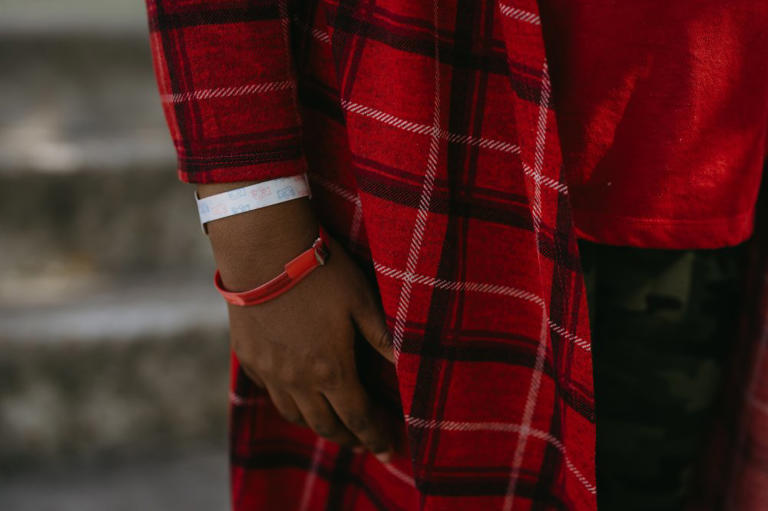
The weeks went on, and Ashley entered her second trimester. She wore bigger clothes to hide her bump, until she was so big that Regina took her out of school. They told everyone Ashley needed surgery for a bad ulcer. “We’ve been keeping it quiet, because people judge wrong when they don’t know what’s going on,” Regina says. She’s been trying to keep Ashley away from “nosy people.” For months, Ashley spent most of the day alone, finishing up sixth grade on her laptop. The family still has no plans to tell anybody about the pregnancy. “It’s going to be a little private matter here,” Regina says.
Ashley has ADHD and trouble focusing, and has an Individualized Education Program at school. She had never talked much, but after the rape she went from shy to almost mute. Regina thinks she may have been too traumatized to speak. At first, Regina couldn’t even get Ashley to tell her about the rape at all.
Related video: Majority of voters favor abortion rights, Ohio is latest example (MSNBC)
what it showed us is that Ohioans care about theirLoaded: 28.55%PlayCurrent Time 0:20/Duration 4:12Quality SettingsCaptionsFullscreen
More videos
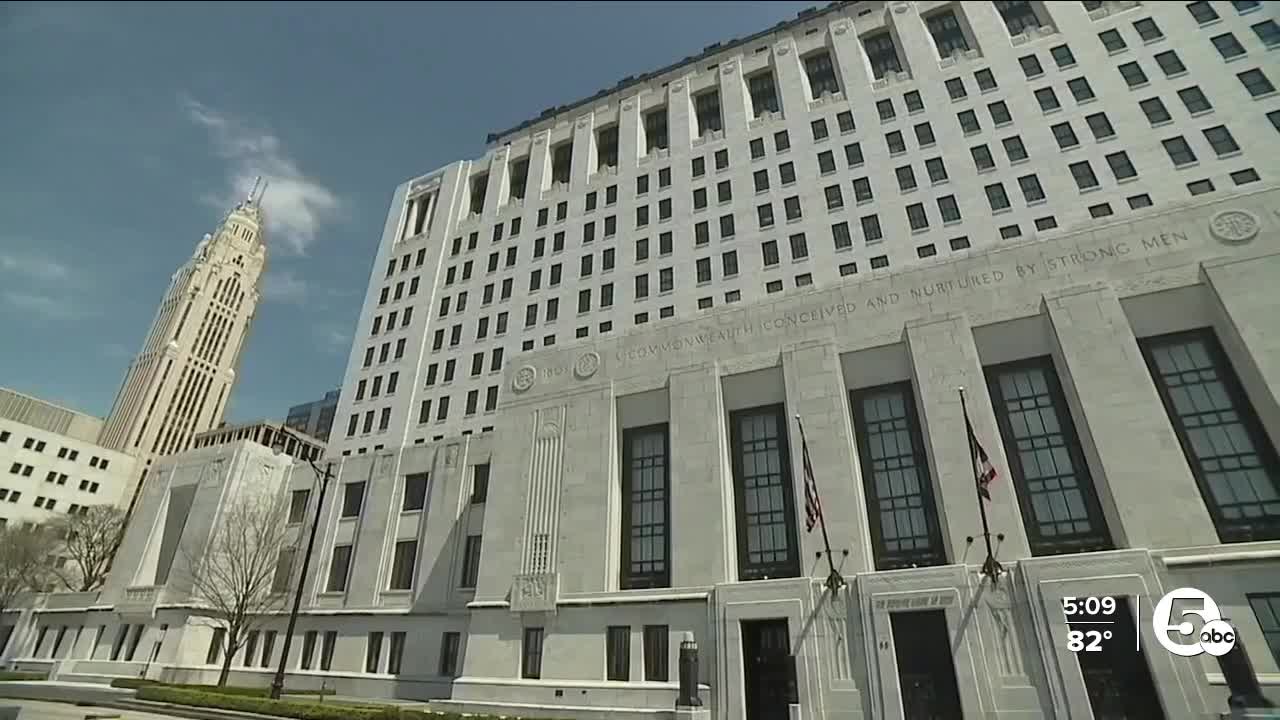
 WEWS Cleveland, OHOhio Supreme Court could reinstate 6-week abortion ban ahead of Nov. vote2:55
WEWS Cleveland, OHOhio Supreme Court could reinstate 6-week abortion ban ahead of Nov. vote2:55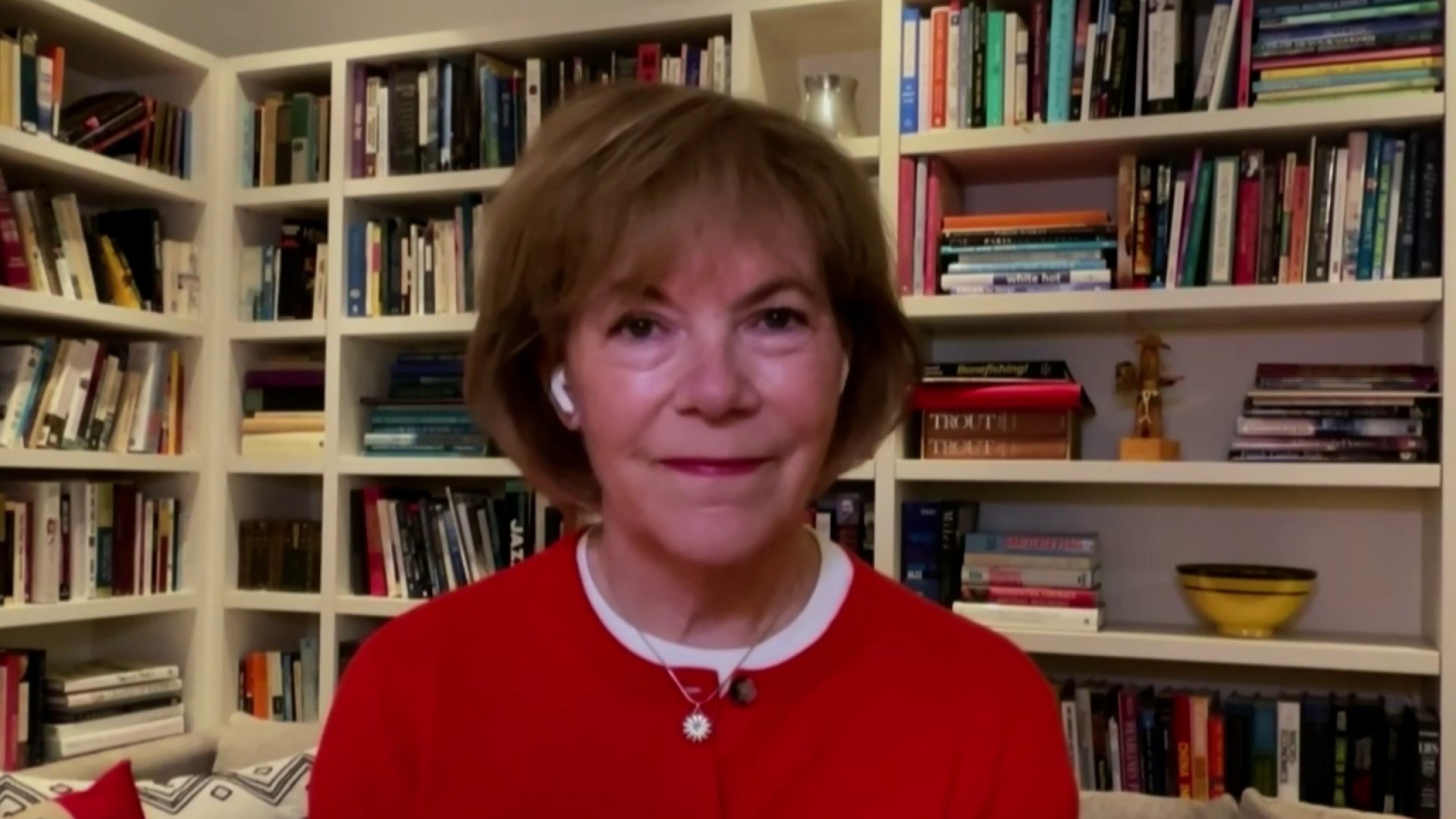
 MSNBCSen. Tina Smith: GOP has a ‘values problem’ on abortion rights5:36
MSNBCSen. Tina Smith: GOP has a ‘values problem’ on abortion rights5:36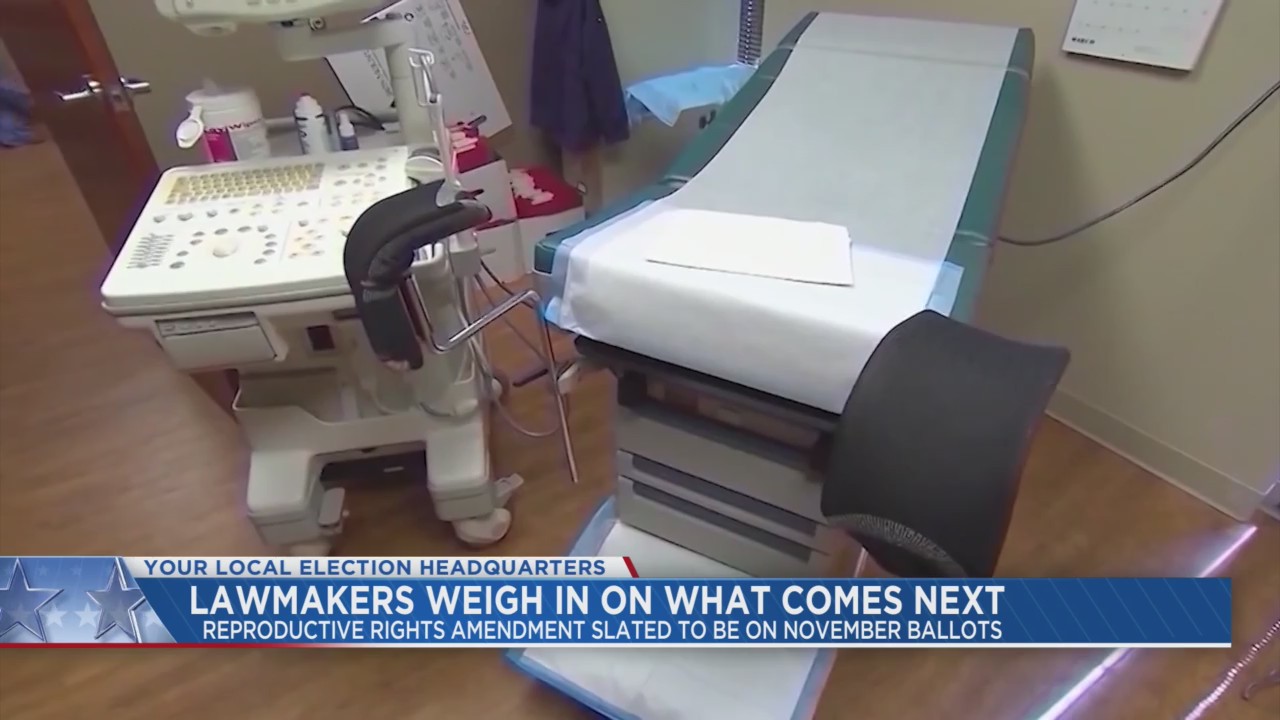
 WCMH ColumbusWhat Issue 1’s failure means for abortion in Ohio2:16
WCMH ColumbusWhat Issue 1’s failure means for abortion in Ohio2:16In an interview in a side bedroom, while Ashley watched TV with Peanut in another room, Regina recounted the details of her daughter’s sexual assault, as she understands them. It was a weekend in the fall, shortly after lunchtime, and Ashley, then 12, had been outside their home making TikToks while her uncle and sibling were inside. A man came down the street and into the front yard, grabbed Ashley, and covered her mouth, Regina says. He pulled her around to the side of the house and raped her. Ashley told Regina that her assailant was an adult, and that she didn’t know him. Nobody else witnessed the assault.
Shortly after finding out Ashley was pregnant, Regina filed a complaint with the Clarksdale Police Department. The department's assistant chief of police, Vincent Ramirez, confirmed to TIME that a police report had been filed in the matter, but refused to share the document because it involved a minor.
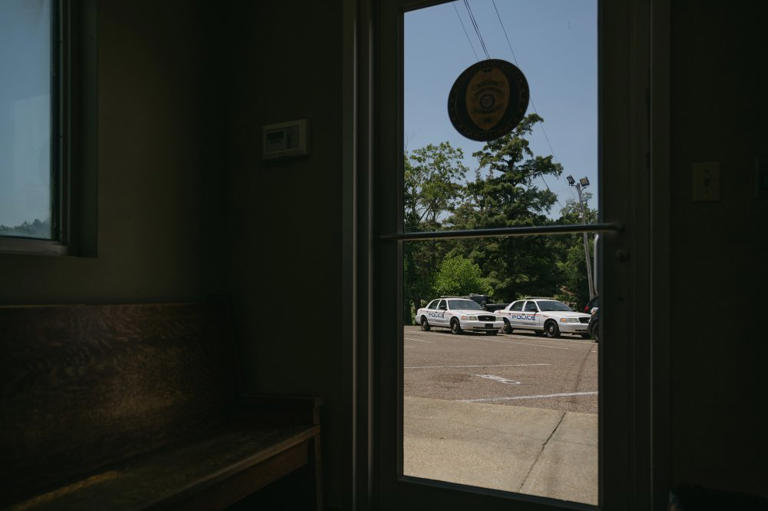
Regina says that another family member believed they had identified the rapist through social-media sleuthing. The family says they flagged the man they suspected to the police, but the investigation seemed to go nowhere. Ramirez declined to comment on an ongoing investigation, but an investigator in the department confirmed to TIME that an arrest has not yet been made. With their investigation still incomplete, police have not yet publicly confirmed that they believe Ashley’s pregnancy resulted from sexual assault.
Regina felt the police weren’t taking the case seriously. She says she was told that in order to move the investigation forward, the police needed DNA from the baby after its birth. Experts say this is not unusual. Although it is technically possible to obtain DNA from a fetus, police are often reluctant to initiate an invasive procedure on a pregnant victim, says Phillip Danielson, a professor of forensic genetics at the University of Denver. They typically test DNA only on fetal remains after an abortion, or after a baby is born, he says.
But almost three days after Peanut was born, the police still hadn’t picked up the DNA sample; it was only after inquiries from TIME that officers finally arrived to collect it. Asked at the Clarksdale police station why it had taken so long after Peanut's birth for crucial evidence to be collected, Ramirez shrugged. “It’s a pretty high priority, as a juvenile,” he says. “Sometimes they slip a little bit because we’ve got a lot going on, but then they come back to it.”
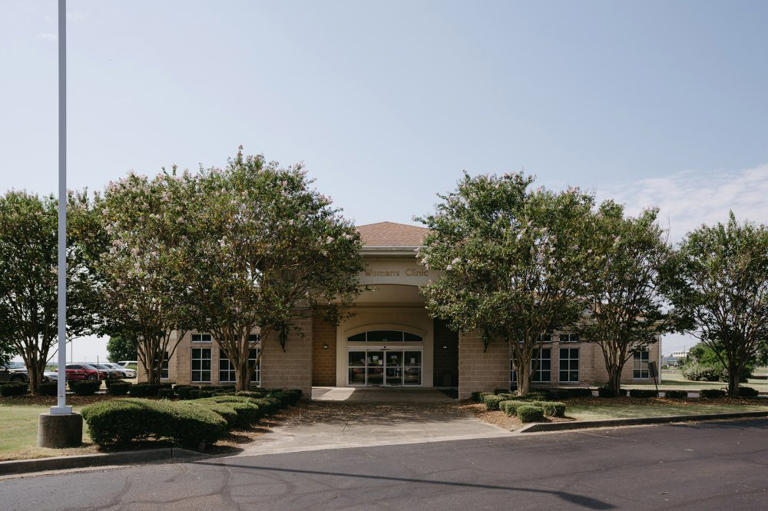
Ashley doesn’t say much when asked how it felt to learn she was pregnant. Her mouth twists into a shy grimace, and she looks away. “Not good,” she says after a long pause. “Not happy.”
Regina’s own feelings about abortion became more complicated as the pregnancy progressed. She got pregnant with her first daughter at 17, and was a mother at 18. “I was a teen,” says Regina, now 33. “But I wasn’t as young as her.”
Regina had considered abortion during one of her own pregnancies. But her grandmother admonished her, “Your mama didn’t abort you.” Now Regina felt caught between her family’s general disapproval of abortion and the realization that her 13-year-old daughter was pregnant as the result of a rape. “I wish she had just told me when it happened. We could have gotten Plan B or something,” Regina says, referring to the emergency contraceptive often known as the “morning-after pill.” “That would have been that.”
Balthrop often sees this kind of ambivalence. Clarksdale is in the heart of the Bible Belt, and many of her patients are Black women from religious families. Even if they want to terminate their pregnancies, Balthrop says, many of them ultimately decide not to go through with it. Since the Dobbs decision, however, Balthrop has seen an increase in “incomplete abortions,” which is when the pregnancy has been terminated but the uterus hasn’t been fully emptied. Medication abortions— abortions managed with pills, which are increasingly available online—are overwhelmingly safe, but occasionally can have minor complications when the pills are not taken exactly as directed. “They're having complications after—not serious, but they'll come in with significant bleeding, and then we still have to finish the process,” Balthrop says, explaining that they sometimes have to evacuate dead fetal tissue.
According to Balthrop, Ashley didn’t have complications during her pregnancy. But she didn’t start speaking more until she felt the baby move, around her sixth month. “That’s when it hit home,” Balthrop says. “She’d complain about little aches and pains that she had never had before. That’s when her mom would come in and say, ‘She asked me this question,’ and the three of us would sit and talk about it.”
How did Ashley feel in anticipation of becoming a mother? “Nervous,” is all she will say. Toward the end of the pregnancy, she was terrified of going into labor, Balthrop recalls. Most of her questions were about pushing, and delivery, and how painful it would be. She was focused on “the delivery process itself,” Balthrop says. “Not, ‘What am I going to do when I take this baby home?’”
The Clarksdale Woman’s Clinic, where Balthrop practices, is across the street from the emergency room at Northwest Regional Medical Center, where Ashley first learned she was pregnant. The clinic is large and welcoming, with comfortable chairs and paintings of flowers on the walls. The staff is kind and efficient, the space is clean, and it helps that the three ob-gyns on staff are Black, since most of the patients are Black women. The clinic’s strong reputation attracts patients from an hour away in all directions. It is a lifeline in a vast region with few other maternity health options.
Even for healthy patients, it can be dangerous to be pregnant in such a rural area. “We have patients who walk to our clinic. They don't have transportation,” says Casey Shoun, an administrative assistant at Clarksdale Woman’s. Some can get Medicaid transportation, but it’s notoriously unreliable. The trip can be hard even for local residents: the roads leading to the clinic don’t have good sidewalks, and temperatures in the Delta regularly reach 100 degrees in the summer.
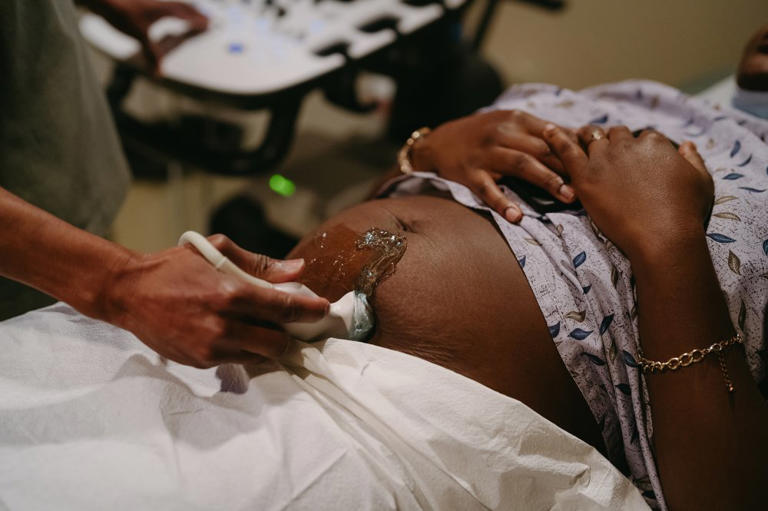
Shoun says the clinic gets patients who are six months pregnant by the time they have their first prenatal appointment. “We've had patients who go to the hospital, and they've already delivered,” Shoun says. Balthrop recalls one woman who went into labor about seven weeks early, and had to drive 45 minutes to get to the hospital. She was too late. “By the time she got here, the baby had passed already,” Balthrop says.
Clarksdale Woman's is equipped to handle routine appointments for a healthy pregnancy like Ashley’s. But a pregnant woman with any complication at all—from deep-vein thrombosis to diabetes, preeclampsia to advanced maternal age—will have to make a three-hour round trip drive to Memphis to see the closest maternal-fetal-medicine specialist. The most vulnerable patients are often the ones who have to travel the farthest for pregnancy care.
Read More: Inside Mississippi's Last Abortion Clinic.
One morning in August, as the clinic filled, Balthrop allowed TIME to interview consenting patients in the waiting room and parking lot. One of them was Mikashia Hardiman, who is 18 years old and pregnant with her first child. Hardiman had just had her 20-week anatomy scan, and learned that she has a shortened cervix, which means her mother now has to drive her to Memphis to see a specialist.
Jessica Ray, 36, was 13 weeks pregnant with her third child. Three years ago, when she suddenly went into labor with her second child at 33 weeks, she drove herself 45 minutes to the hospital and delivered less than half an hour after she arrived. Ray knows the travel ordeals ahead of her: because she had preeclampsia with her first two pregnancies, she’ll have to go see the specialist in Memphis each month. “You have to take off work and make sure somebody's getting your kids,” Ray says.
Balthrop, who has three kids of her own, has long considered moving to a different region with a better education system. "I feel like I can’t," she says. "I would be letting so many people down."
But the clinic is under serious financial strain. Between overhead, malpractice insurance, the increasing costs of goods and services, and decreasing insurance reimbursements, Balthrop and her colleagues can barely afford to keep Clarksdale Woman's open. They’re considering selling the practice to a hospital 30 miles away. If that happened, Balthrop says, babies would no longer be delivered in Clarksdale, a city of less than 15,000. Some of her patients would have to leave the Delta—possibly driving an hour or more—to get even the most basic maternity care.
For the patients who already struggle to make it to Clarksdale, that would spell disaster. "They just wouldn't get care until they show up for delivery at the hospital,” says Shoun, the administrative assistant. “Imagine if we weren't here. Where would they go?"

Ashley started feeling contractions on a Saturday afternoon when she was 39 weeks pregnant. She called Regina, who came home from work, and together they started timing them. They arrived at the hospital around 8 p.m. that night. An exam revealed Ashley was already six centimeters dilated. Her water broke soon after, and she got an epidural. She delivered Peanut within five hours. Ashley describes the birth in one word: “Painful.”
For Regina, the arrival of her first grandchild has not eased the pain of watching what her daughter has endured. “This situation hurts the most because it was an innocent child doing what children do, playing outside, and it was my child,” Regina says. “It still hurts, and is going to always hurt.”
Ashley doesn’t know anybody else who has a baby. She doesn’t want her three friends at school to find out that she has one now. Regina is working on an arrangement with the school so Ashley can start seventh grade from home until she’s ready to go back in person. Relatives will watch Peanut while Regina is at work. Is there anything about motherhood that Ashley is excited about? She twists her mouth, shrugs, and says nothing. Is there anything Ashley wants to say to other girls? “Be careful when you go outside,” she says. “And stay safe.”
There is only one moment when Ashley smiles a little, and it’s when she describes the nurses she met in the doctors’ office and delivery room. One of them, she remembers, was “nice” and “cool.” She has decided that when she grows up, she wants to be a nurse too. “To help people,” she says. For a second, she looks like any other soon-to-be seventh grader sharing her childhood dream. Then Peanut stirs in his car seat. Regina says he needs to be fed. Ashley’s face goes blank again. She is a mother now.
She Just Had a Baby. Soon She'll Start 7th Grade. | Time
A mother did not tell her young daughter about baby making!
Doctors cannot perform abortion in this cluster fuck process!
Police very busy avoiding real work!
Family stuck raising rapist's child!
Rapist has parental rights to his child!
Young girl blamed for the massive adult failures in her life!
Conservatives will not want to help this child raise her child!
Educated Doctors do not want to work for the backwater states!
Republicans wonder why they lose elections!
A Horseman’s Parable:
Horses are prey to dogs. Dogs instinctively value horses as a source of food. Horses do their best to protect themselves from this danger. Young horses are very vulnerable and can quickly lose their life without proper training. We train our horses to turn on a dog and chase them like a predator. This training allows a horse to survive with a rider on their back in a terrifying situation. Once trained, both riders and horses can enjoy a wonderful life without fear.
We help victims protect themselves and others from their predator. We discuss options for victims to hold their predator responsible for their crimes against children. We want predators to feel the ramifications of their sex crimes against children. The criminal justice and mental health system "professionals" are making a lot of money off victims of child sex crimes.
Our Mission
A Catholic clergy abuse survivor, Dennis Horion, has been helping victims of child sex crimes transition from victims to survivors for twenty years. Horses have been an important part of this effort. Our horses have helped intimidate public officials and sexual predators in the quest for justice and healing.
We offer our help at no cost to child sex crime victims searching for justice. We teach survivors the power of having a horse as a mental health partner. We have turned sexual predators into prey.
We have worked to demand justice from a failed criminal justice system, warn the community of a sexual predator in their midst, and train victims to transition to survivors with horses and dogs as mental health partners.
A Message to Survivors; Truth Is the First Casualty of War
Victims of child sex crimes are in a war with their predator. Your predator will lie, cheat, steal, and may resort to violence to avoid facing the consequences of their behavior. The severity of the consequences both in and out of prison for a sexual predator are very severe. You can expect your predator to use every resource to avoid taking responsibility for the harm inflicted upon you.
Survivors are at the mercy of public officials when seeking justice. You will be involved in a system that pays third rate talent from a variety of sources to represent your interest. Make no mistake, you will be responsible for managing your justice. Everyone involved has a lot of practice talking a good game. Most public employee’s careers are their first priority. Public employees have bills to pay, and they will take care of themselves before advocating for your justice.
As a nonprofit organization, we can offer you advice and assistance in your search for justice. You will have our support and advice during this long and difficult journey. We have never taken public money to support our mission. We need to speak truth to power. It is impossible to hold public officials responsible while taking their money. We do not work for anyone but victims of crime.
We will help you learn the beauty and support that horses and dogs offer to sex crime victims. You can learn the impact that animals can have during the difficult times in your life. Once you understand the value of animals, you can work to keep them in your life.
If you are a victim of a child sex crime needing support and advice you can call us at 770-712-8685 or email us at

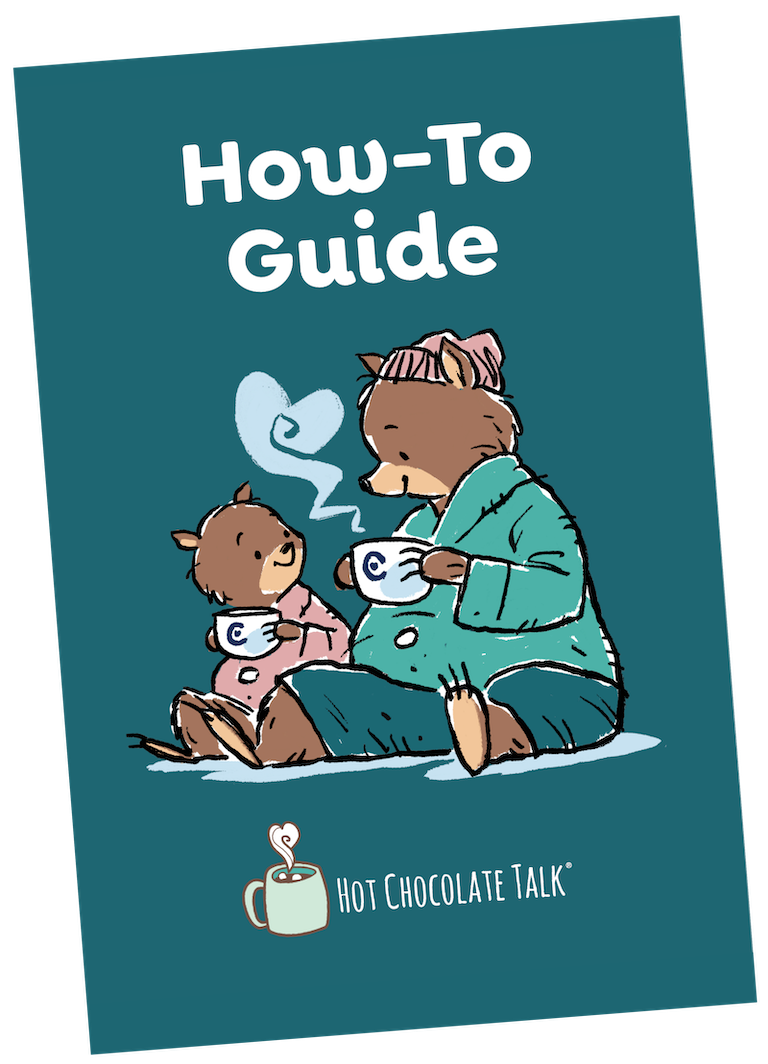
If you’re like many parents, you may know it’s important to talk with your child about sexual abuse but aren’t sure what to say or when to say it. Our How-To Guide makes it easy to approach these vital safety conversations so you can empower your child to report and refuse sexual abuse:
Our experts have packed decades of research into easy-to-use guides to help you begin these crucial conversations with your child every day—at any age, from toddler to teen.
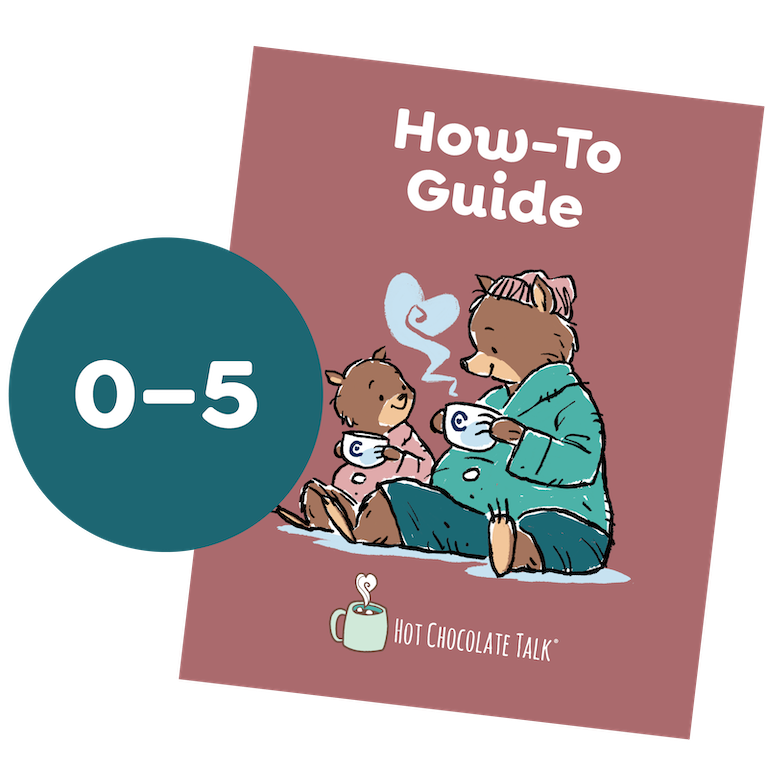 Download Now
Download Now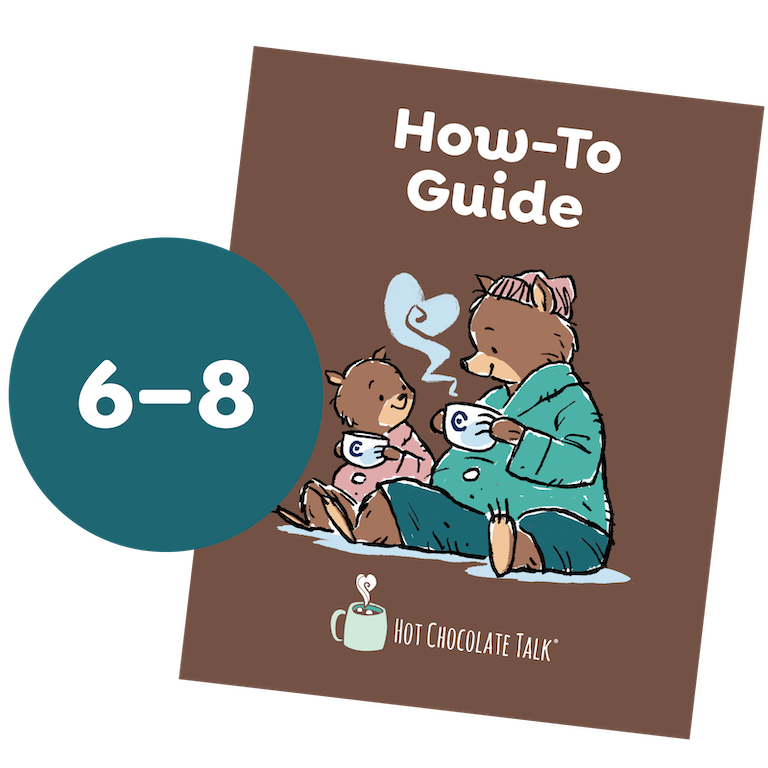 Download Now
Download Now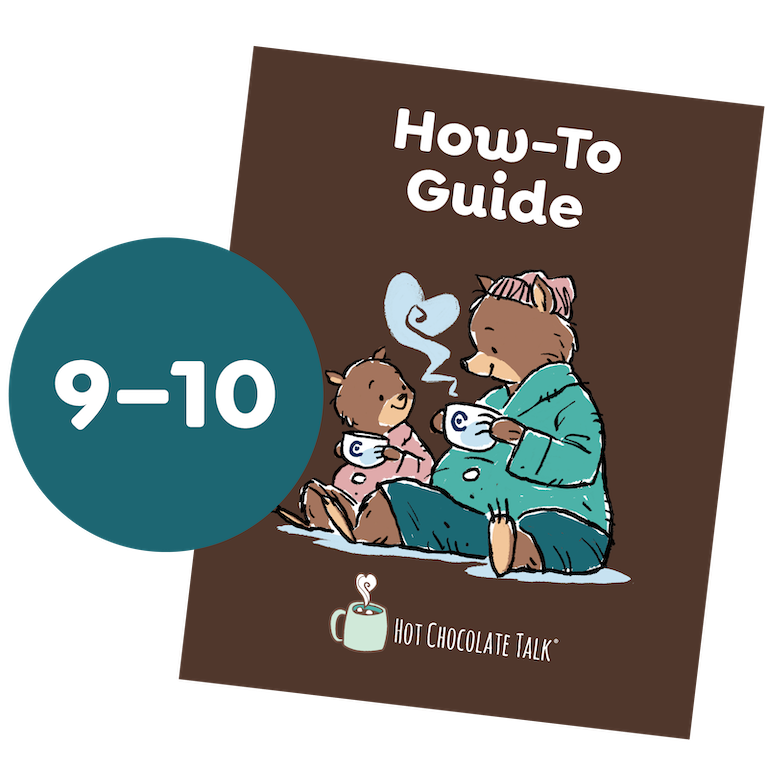 Download Now
Download Now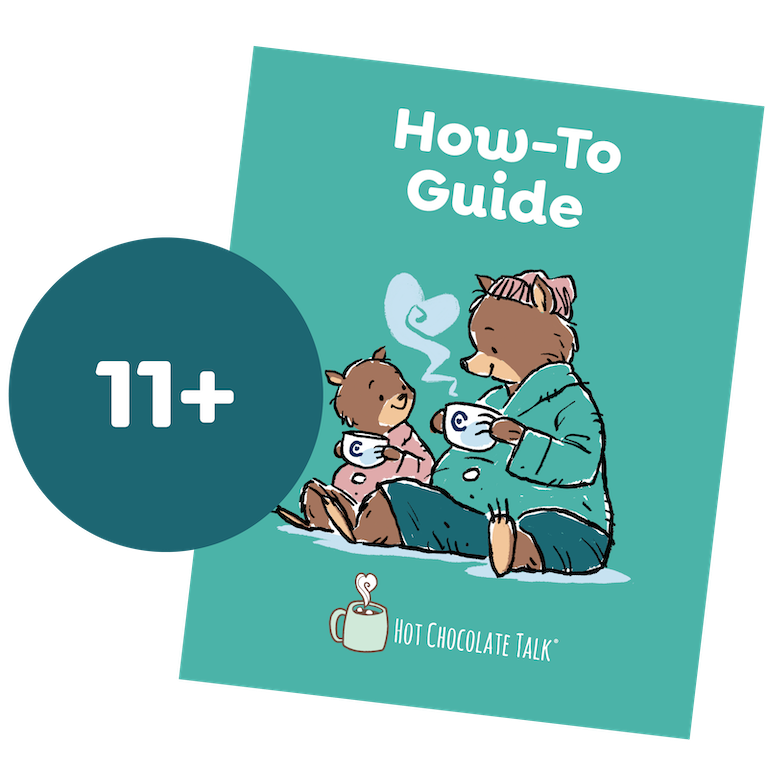 Download Now
Download Now

![]()
Childhelp
Visit Site | 800-422-4453
Rape, Abuse & Incest National Network
Visit Site | 800-656-4673
National Sexual Violence Resource Center
Visit Site | 877-739-3895
National Human Trafficking Hotline
888-373-7888 | or text HELP to 233733
Hot Chocolate Talk® Campaign | Committee for Children (cfchildren.org)
Why are we so bad at prosecuting sexual assault?
By Liza Anderson|Contributor
2:00 AM on Sep 15, 2019 CDT
Rape is the easiest violent crime to get away with in the United States. On average, less than 1% of sexual assaults ever lead to conviction.
Let me break that number down. According to the Justice Department's most recent National Criminal Victimization Survey, only 23% of rape or sexual assault victims reported the crime to police.
Of those who do report, the FBI's Uniform Crime Reporting database shows that only about 20% of reports lead to arrest. According to the nonprofit Rape, Abuse and Incest National Network, which analyzes national data regarding sexual assault and rape, only about half of arrests lead to trial.
The most reliable data on conviction rates comes from a Justice Department study that analyzed convictions between 1990 and 2009. That study concluded that rape trials end in conviction around 35% of the time.
Taken together, this means that only about 0.8% of assaults lead to a conviction.
The data here is admittedly murky. National studies don’t consistently distinguish rape from sexual assault, an umbrella term that includes rape as well as other forced sex acts. National data regarding convictions and trials is incredibly difficult to find, if the data is tracked at all. Many victims are assaulted by the same person, but reliable statistics on repeat offenders aren’t available. All of the available data either relies on victims reporting to police or reporting on a survey, and the difficulty of coming forward makes it unlikely the data truly reflects the prevalence of sexual assault. The statistics themselves are always in flux, as the data shifts year-to-year.
But one thing is certain: The United States is bad at prosecuting sexual assault. And when less than 1% of assaults lead to any repercussions, more violent criminals walk free.
So how do we get better at prosecuting sexual assault?
We need to change how we treat sexual assault victims.
At every stage in the judicial process, an undercurrent of disbelief, distrust and mistreatment toward victims makes it less likely that rapists are prosecuted for their crimes.
Let’s start with reporting the crime. No crime will ever be investigated unless police know about it. The Justice Department puts the percentage of rapes and sexual assaults reported at between 20% and 40%, as the number fluctuates each year.
Reporting a sexual assault can be traumatic. The process of reporting is inherently invasive when your body is the scene of the crime. Victims who report immediately after the assault undergo a SANE exam, performed by a sexual assault nurse examiner, in which nurses photograph the victim’s body and collect evidence from their genitals. Recounting the experience means reliving the worst moment of your life in front of strangers. Rape victims often feel ashamed, or they blame themselves for what happened, and talking about the assault is incredibly difficult.
Many police departments exacerbate this problem when they misunderstand the role that trauma plays in a victim’s behavior. When investigators aren’t trained in trauma-informed practices, they might use interrogation tactics on victims, which only makes the process more traumatizing.
The specter of the false rape allegation looms large for victims and police. Victims who fail to report often say they didn't expect to be believed, and many who do report find that they weren't. One detective told The Atlantic that he thought 8 out of every 10 cases he investigated were false.
How common are false allegations really? No one knows for sure. But all of the research suggests they’re rare.
The consensus among academic researchers seems to be that between 2% and 10% of reports are false. Some studies say as high as 40% or 90%, but most of the available literature puts the figure much lower.
It’s important to note that every study I could find analyzing false reports relied on what percentage of reports were marked “false” by the police, not the number of people successfully prosecuted for filing false reports. There aren’t any national requirements for what constitutes a false report, and there isn’t any oversight or appeals process if police label a report “false.”
Still, there’s a persistent idea in American society that it’s common for women to lie about being raped.
False reports do happen, and when they do, they go viral. And why not? The stories tend to be really interesting. Take for example the Duke lacrosse case, or the Rolling Stone article. We can all think of an example of a false report that became a media sensation.
But the amount of coverage given to false rape allegations can make them seem far more common than they actually are, creating an atmosphere of mistrust for victims and police.
There aren’t reliable statistics about rape investigations. Police departments are often shrouded by nature, and, to be fair, many cases aren’t easy to run down. Nonetheless, we should recognize that when only about 20% of rape investigations lead to arrest, something isn’t working the way it needs to.
Even when an arrest is made, prosecutors exercise immense discretion when it comes to what cases they pursue. Many are very good about going after these crimes, but we shouldn’t automatically believe that all of them are pursuing all of the cases they should.
The city of Austin is currently facing a civil suit alleging gender discrimination for its handling of sexual assault cases. According to the suit filing, of the 224 cases referred to prosecutors by police between 2016 and 2017, the district attorney's office accepted only 77. Of those 77, only one went to trial. The victim in that case was a man.
Why are rape convictions so hard to secure? Prosecutors say that juries don’t trust victims either. Jurors, who are typically older and more conservative than the general population, tend to have a narrow view of what constitutes a sexual assault.
Materials distributed to prosecutors by the National Sexual Violence Resource Center, a nonprofit and field leader on sexual assault, warn prosecutors that juries are unlikely to believe victims who don't describe what they see as "real rape."
In a “real rape,” the victim and the rapist are strangers. The rapist uses a weapon, and there are wounds to prove it. The victim fights back, and she is completely sober at the time. She cries when she tells police what happened.
This “real rape” bears little resemblance to the reality of most rapes. Victims rarely fight back — they freeze up. Most know their assailants. Many victims go into survival mode and seem emotionless when they recount their experiences.
In interviews, prosecutors described the heartbreaking realization that juries often lack the ability to be objective in sexual assault cases. They make up their minds before the trial even starts.
This is a criminal justice problem.
When rapists aren’t prosecuted, more people are at risk of getting raped. More victims feel abandoned by the justice system and unheard by their peers. No one benefits when our system fails to properly identify and respond to crime.
Police departments should implement better policies to address this problem. They should seek out trauma-informed investigative practices and focus on building trust with victims. Prosecutors can be bolder and fight for more convictions.
But if we want fewer rapists on the streets, we need to rethink how we treat sexual assault victims. Rape victims shouldn’t be terrified that if they come forward, they will be called liars, or slut-shamed, or interrogated.
Our beliefs matter. How we talk about sexual assault matters. One in 5 women in the U.S. will be raped within her lifetime, according to the National Sexual Violence Resource Center. Someone you love is probably one of them. And she's probably paying attention.
Why are we so bad at prosecuting sexual assault? (dallasnews.com)
The statistics and facts below can help you understand what child sexual abuse is, the risk factors and consequences for survivors, and how to identify and report suspected abuse. For all statistics and references, download the full statistics PDF.

Child sexual abuse is far more prevalent than people realize. Find out how big the problem really is.
Magnitude Statistics
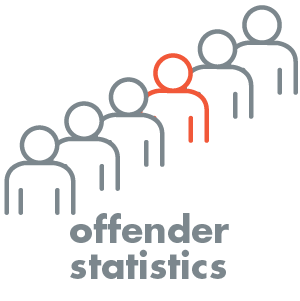
Those who molest children look and act just like everyone else. Abusers can be neighbors, friends, and family members.
Offender Statistics
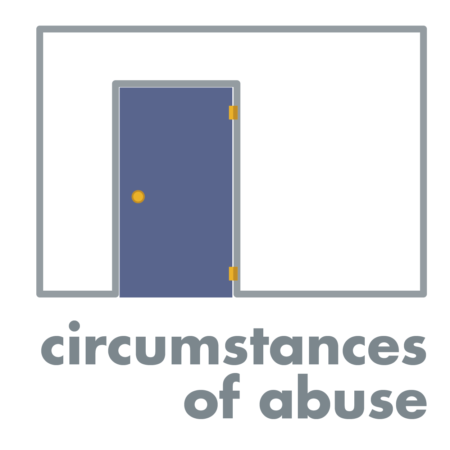
Child sexual abuse takes place under
specific, often surprising circumstances.
Circumstances Statistics

While no child is immune, there are child and family characteristics that can heighten the risk of sexual abuse.
Risk Factor Statistics
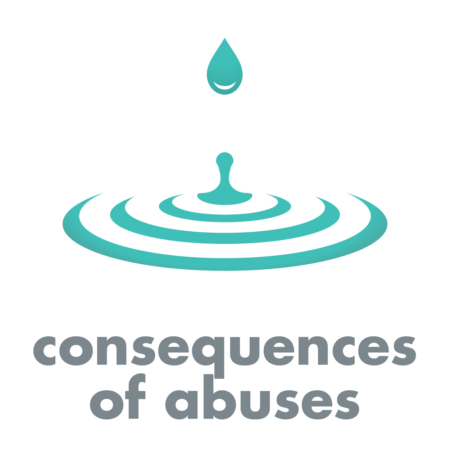
Emotional and mental health problems are often the first consequence and sign of child sexual abuse.
Consequences Statistics

Only about one-third of child sexual abuse incidents are identified and even fewer are reported.
Reporting Statistics
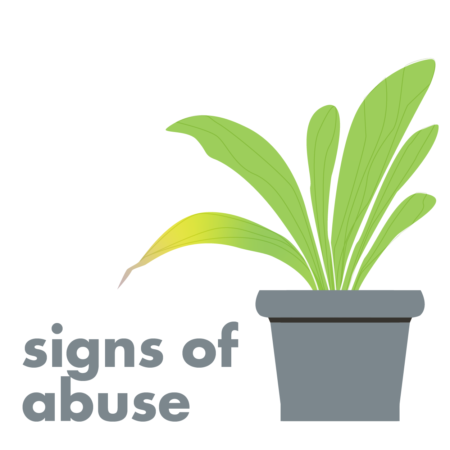
Do you know what to do if you suspect or discover child sexual abuse? Learn the facts about signs of abuse that will help you identify when to report.
What to Do Facts

Download a pdf with all statistics.
All Statistics

Georgia Sex Offenders Law protects the citizens of the state from persons convicted of a dangerous sexual crime. The law states that persons convicted for a sexual offense in Georgia must register with the local sheriff. The Law took effect on July 1, 1996, and prevents sex offenders from re-offending by keeping an eye on them.
All sex offenders in Georgia must register and update their information unless exempted by a court. This information is available to the public (including the victims of previous sexual abuse) on the internet. The report will help them take precautionary measures against sex offenders.
The Law covers both sex offenders living in Georgia and those convicted in another state but intends to live and work in Georgia.
The law ensures that sex offenders in Georgia live 1000 feet away from facilities like:
Sex offenders in Georgia (depending on the nature of the sex crime) also suffer restrictions on places of employment. They are not allowed to work in organizations that offer services to persons under age 18.
Identify Nearby Sex Offenders in Georgia ⮕
According to the State Law, persons convicted of sexual crimes must register in the State’s criminal department. Georgia Sex Offenders Registry stores and updates this information. The Registry verifies this information before it is available to the public through the internet.
Georgia Sex Offenders Law classifies offenders into 3 categories:
Registration requirements for each level differ and depend on the law. Sexually dangerous predators register under Level 3. They wear an electronic monitoring device for the rest of their lives.
You can search for sex offenders around you in Georgia using the Registry.
https://www.registeredoffenderslist.org/georgia-sex-offenders.html
Data: PRRI, Health of Congregations Survey; Chart: Axios Visuals
Nearly a quarter of Americans say they used to follow a different religious tradition or denomination than the one they practice now — a percentage that keeps growing, a new survey says.
Why it matters: The jump in religion-switching comes as many Americans say they no longer believe in their initial religion's teachings — or, in many cases, disagree with a religion's stance against LGBTQ+ people.
By the numbers: The nonpartisan Public Religion Research Institute survey of people across the country found that a quarter of Americans (24%) say they've changed religious traditions or denominations over their lifetime or recently.
The intrigue: The survey found that the Catholic Church had lost the highest percentage of followers (39%) to the group without a religious affiliation.
Between the lines: A 2022 survey by PRRI's American Values Atlas found that only 64% of Americans identify as Christian — and the percentage has been dropping.
Zoom in: Among those who switched, 56% said they changed because they stopped believing in the religion's teachings.
Yes, but: Most churchgoers (56%) do not believe their current church is more divided by politics than it was five years ago, the study found.
What they're saying: "There's essentially kind of a paradox happening. On the one hand, there is more religious churning. There are also more people in America who are becoming less religious, " PRRI CEO Melissa Deckman told Axios.
Bottom line: Members of Gen Z — now ages 11 to 26 — are switching and shunning religion faster as young adults than other Americans. That's expected to continue.
Methodology: The Health of Congregations Survey was conducted Aug. 9-30 by PRRI. The poll is based on a representative sample of 5,872 adults (age 18 and older) living in all 50 states and the District of Columbia who are part of Ipsos' Knowledge Panel®.
A rising number of Americans are switching religions (axios.com)
A young child is married to a middle-aged carpenter, and she has a baby without sex with her husband. When she gives birth to a young child, three grown men came to the birth with gifts for the mother. The answer was the birth of the son of God is the origin of the child's birth.
The Real Story of Jesus' Birth | Kevin Bridges: The Brand New Tour - YouTube
Most U.S. Catholics say sexual misconduct is not unique to their church
More than 15 years after U.S. bishops pledged “zero tolerance” for sexual abuse of children by Catholic priests, reports of previously unpublicized misconduct continue to receive wide media coverage. A Pennsylvania grand jury last year uncovered decades of sexual abuse and coverup by Catholic leaders, and Cardinal Theodore McCarrick – formerly the archbishop of Washington, D.C. – was forced to resign amid allegations that he sexually abused adults and minors.
Americans are paying attention. A new Pew Research Center survey finds that about nine-in-ten U.S. adults – including 95% of Catholics – have heard at least “a little” about recent reports of sexual abuse and misconduct by Catholic priests and bishops, including a clear majority who say they have heard “a lot.” And, overall, about eight-in-ten U.S. adults say the recent reports of sexual abuse and misconduct by Catholic priests and bishops reflect “ongoing problems that are still happening” in the church. Far fewer (12%) think the recent reports reflect “things that happened in the past and mostly don’t happen anymore.”
While U.S. adults generally agree that the recent reports of sexual misconduct by Catholic priests and bishops reflect continuing problems, the public is divided over whether this is a problem unique to the Catholic Church. Roughly half of survey respondents say sexual abuse and misconduct is more common among Catholic priests and bishops than among leaders in other religious traditions (48%), while a nearly identical share say abuse is equally common among leaders in other religions (47%). Just 3% say abuse is less common in the Catholic Church than in other religious traditions.
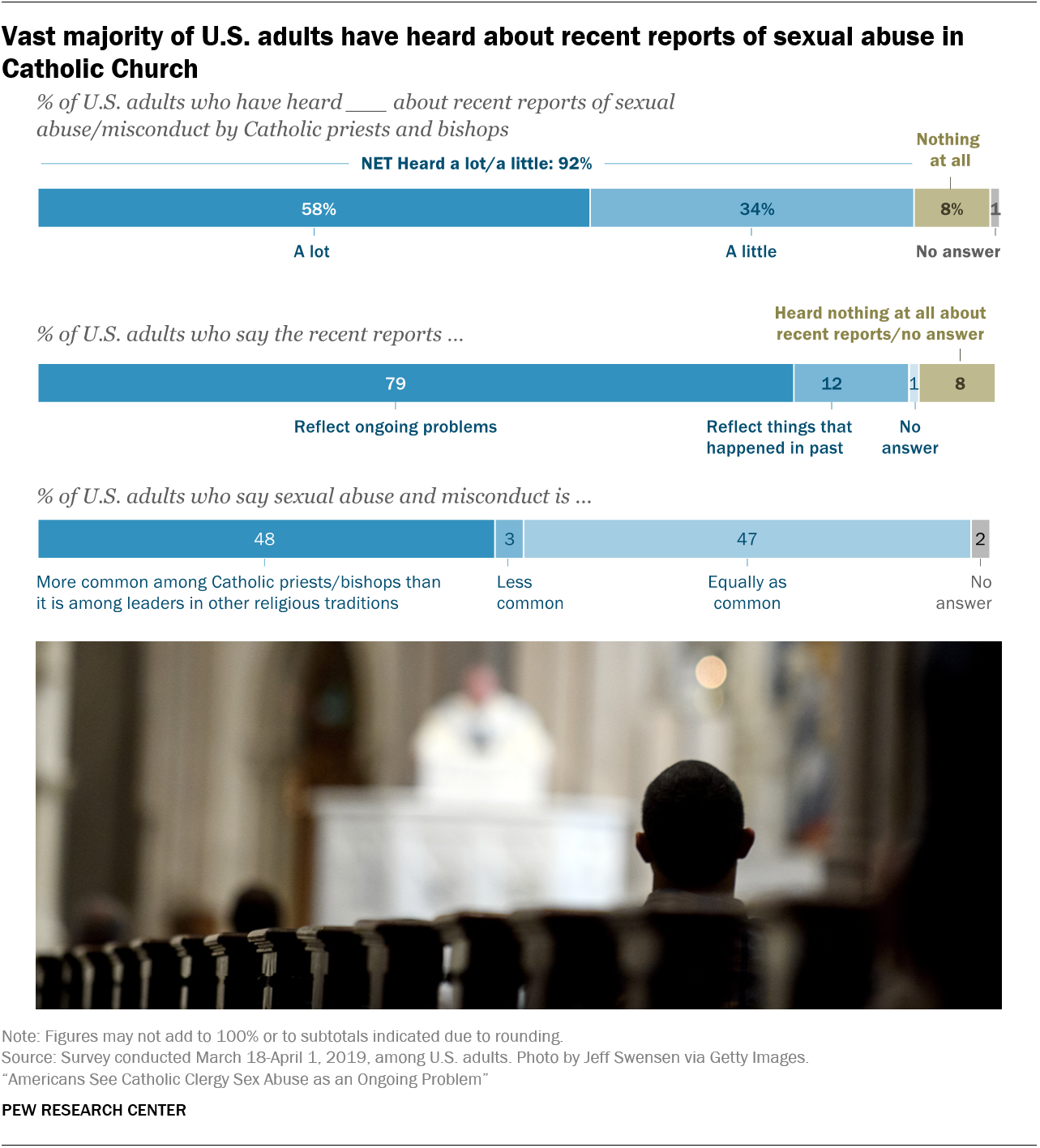
What do U.S. Catholics think about these issues? A substantial majority (69%) say that abuse by Catholic clergy is an ongoing problem. However, U.S. Catholics are more likely than other Americans to say it has mostly stopped; one-quarter of Catholics (24%) say recent reports of misconduct reflect things that happened in the past and mostly don’t happen anymore, while just 9% of non-Catholics think the abuse happened in the past and mostly no longer goes on. Eight-in-ten non-Catholics (81%) say the problems in the Catholic Church are ongoing.
Catholics also are less likely than other Americans to see sexual abuse as a uniquely large problem among Catholic clergy. A majority of U.S. Catholics (61%) say sexual abuse and misconduct is just as common among leaders in other religious traditions as it is among Catholic priests and bishops, while only a third (33%) say sexual abuse is more common in the Catholic Church. By contrast, non-Catholics are somewhat more likely to say that sexual abuse happens disproportionately in the Catholic Church (51%) than they are to say it is equally common across religious traditions (44%).
Similarly, most Catholics say sexual abuse of children is just as common among other adults who work with children, such as teachers, coaches and camp counselors, as it is among religious leaders (see here).
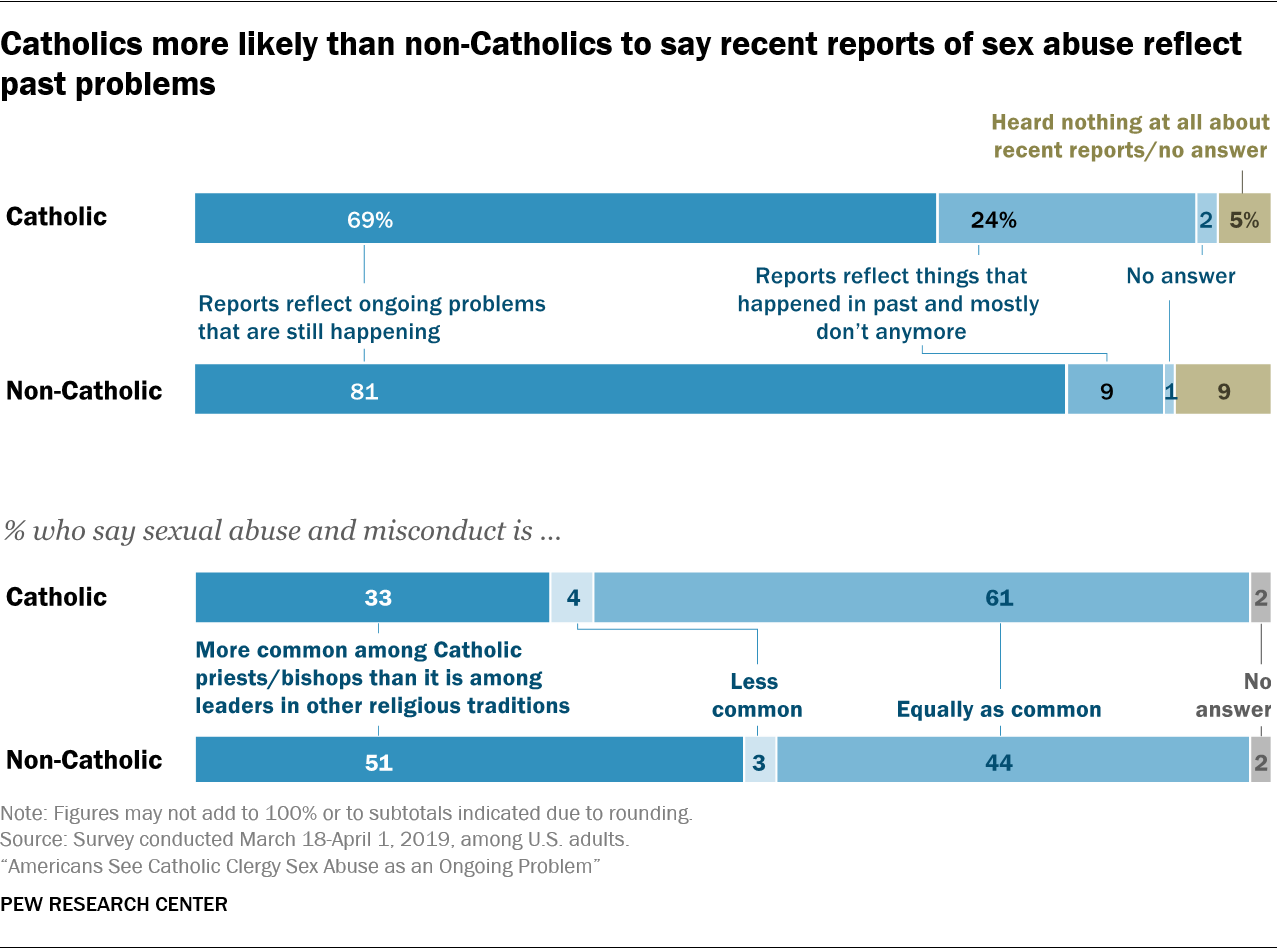
The survey also asked a number of questions tailored specifically to Catholics in order to measure their response to reports of sexual abuse in the church. Nearly half of U.S. Catholics (46%) say they have discussed the recent reports at least some with family, friends or acquaintances.
In addition, one-quarter of U.S. Catholics say they have scaled back Mass attendance (27%) or reduced the amount of money they donate to their parish (26%) in response to the recent reports of sexual abuse and misconduct. Fewer (18%) say they have expressed support to the priests at their parish.1
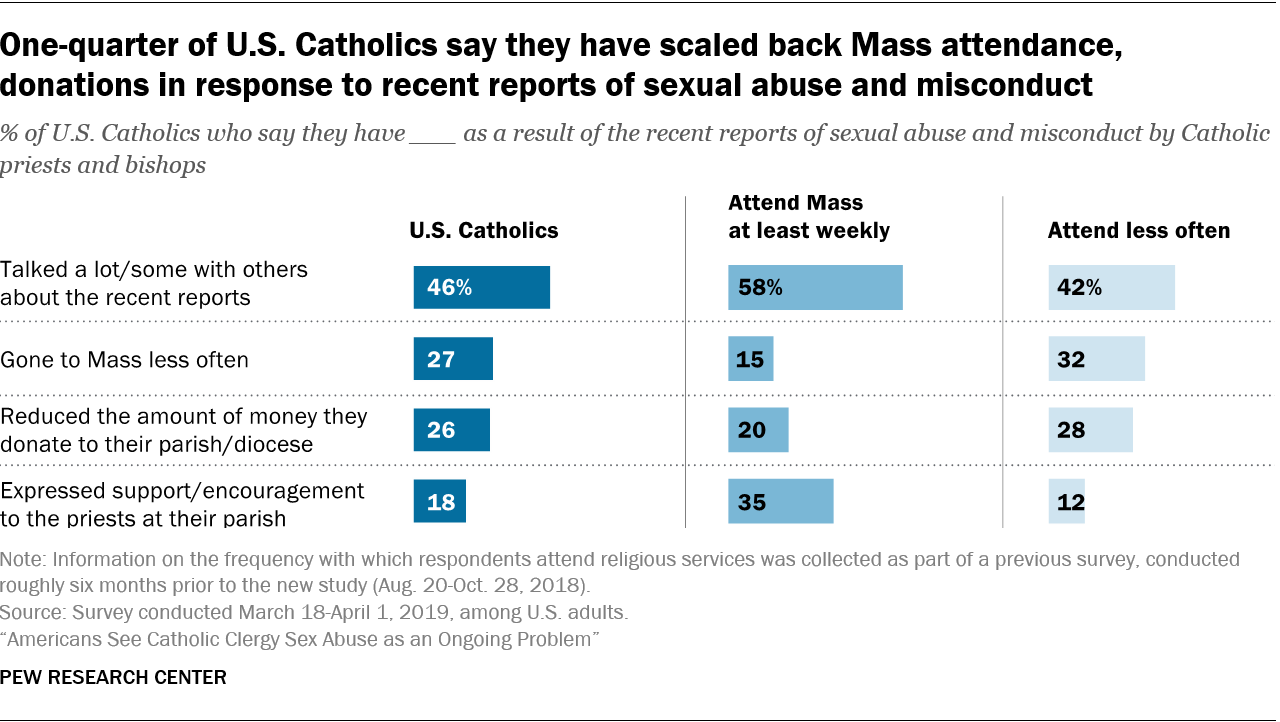
Catholics who say they attend Mass at least weekly are more likely than less-frequent attenders to say they have talked with family, friends or others about the reports of abuse. Roughly six-in-ten weekly attenders say they have done this (58%), compared with 42% of Catholics who attend Mass less often. And about one-third of weekly attenders (35%) say they have expressed support or encouragement to the priests at their parish, while only 12% of less-frequent attenders have done so. On the other hand, weekly Mass attenders are less likely than others to say their attendance at Mass has dipped (15% vs. 32%) or that they have reduced their donations (20% vs. 28%) in response to reports of sexual abuse in the church.
The new survey also finds that U.S. Catholics express mixed opinions about the way Catholic leaders have responded to reports of abuse and misconduct within the church. Slightly more than half of Catholics say Pope Francis has done an “excellent” or “good” job responding to recent reports of abuse (55%).2By comparison, about half (49%) say their bishop has done at least a good job responding to the reports, while fewer (36%) say the same about U.S. bishops as a whole.
Again, Catholics’ opinions on these questions vary by how often they attend Mass. Among Catholics who say they attend on a weekly basis, half or more express favorable opinions about the way that Pope Francis, their own bishop and the U.S. bishops as a whole have handled reports of sexual abuse. Opinions are less positive among Catholics who attend Mass less often; just 30% in this group give U.S. bishops excellent or good ratings.
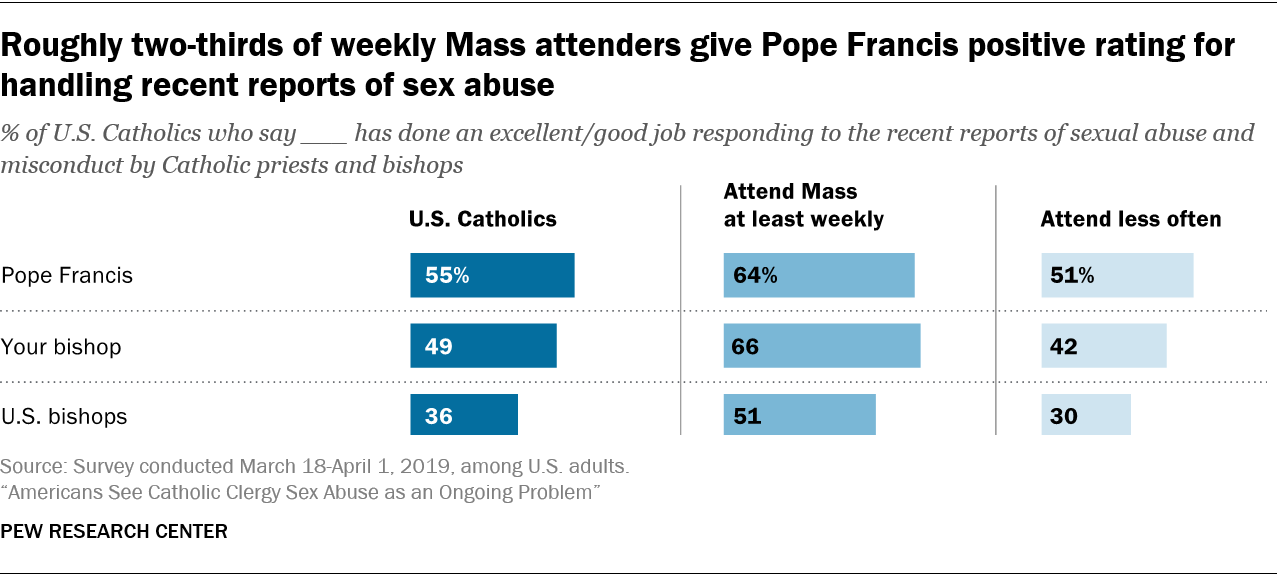
There are few, if any, consistent patterns on these and other questions among Catholics by age, gender, education, political party or other factors (see detailed tables).
These are among the key findings from a nationally representative survey of 6,364 U.S. adults conducted online March 18 to April 1, 2019, using Pew Research Center’s American Trends Panel. The survey was conducted a few weeks after Pope Francis convened a Vatican summit on the sexual abuse crisis in late February, but before Francis issued new rules for reporting accusations. Other findings from the survey include:
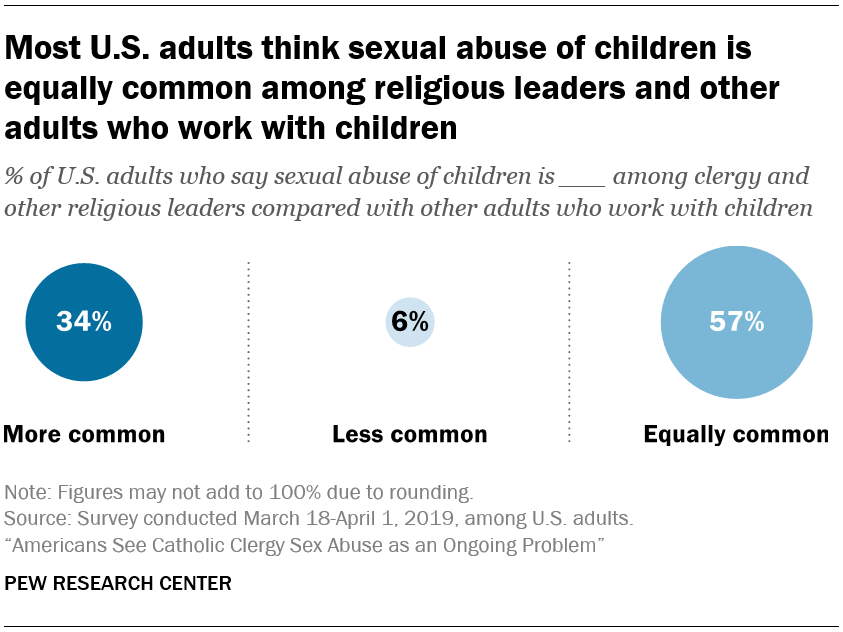 Most U.S. adults think sexual abuse of children does not occur more often in religious settings than in nonreligious settings. A majority of the public (57%) says the sexual abuse of children is equally as common among clergy and other religious leaders as it is among other adults who work with children, such as teachers, coaches or camp counselors. Still, about a third (34%) think sexual abuse of children is more common among religious leaders than among other adults who work with children, while just 6% think it is less common.
Most U.S. adults think sexual abuse of children does not occur more often in religious settings than in nonreligious settings. A majority of the public (57%) says the sexual abuse of children is equally as common among clergy and other religious leaders as it is among other adults who work with children, such as teachers, coaches or camp counselors. Still, about a third (34%) think sexual abuse of children is more common among religious leaders than among other adults who work with children, while just 6% think it is less common.The rest of this report looks at these questions in more detail.
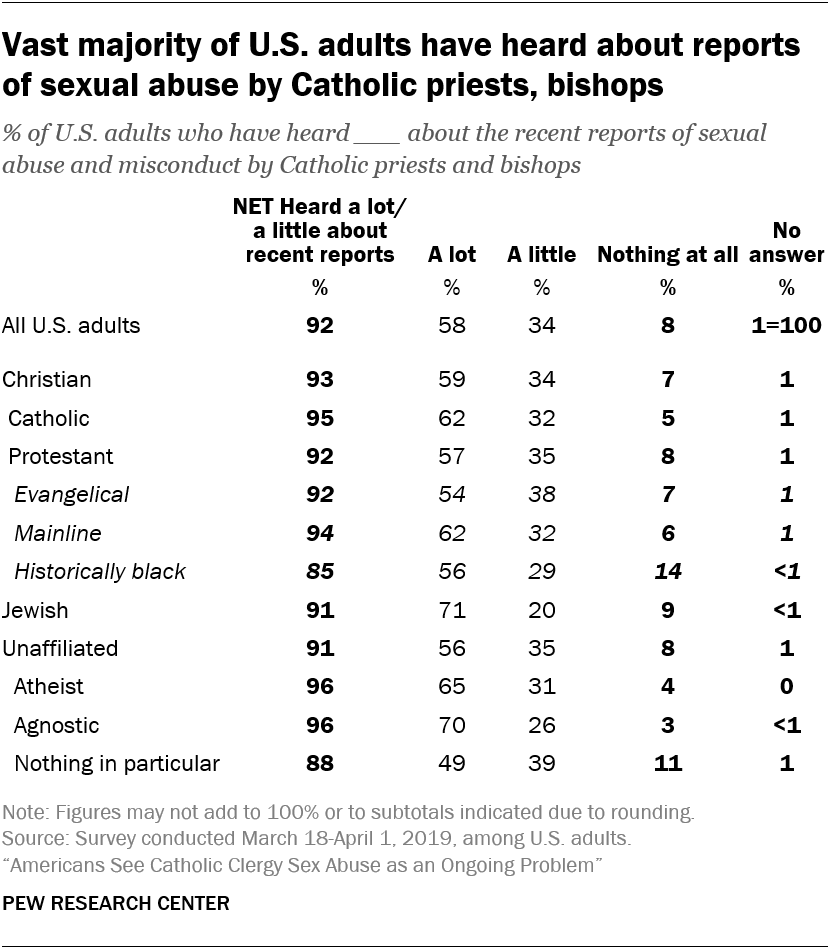 Roughly nine-in-ten U.S. adults have heard at least a little about recent reports of sexual abuse and misconduct by Catholic priests and bishops. This includes a majority (58%) who have heard “a lot” about the recent reports, one-third (34%) who have heard “a little,” and just 8% who have heard nothing at all.
Roughly nine-in-ten U.S. adults have heard at least a little about recent reports of sexual abuse and misconduct by Catholic priests and bishops. This includes a majority (58%) who have heard “a lot” about the recent reports, one-third (34%) who have heard “a little,” and just 8% who have heard nothing at all.
Familiarity with the recent reports of abuse and misconduct by Catholic priests and bishops is broad-based. Large majorities across Christian traditions – not to mention Jews and people with no religious affiliation – say they have heard at least a little about the recent reports, including roughly half or more in each group who have heard “a lot” about them.
Nearly all Catholics included in the survey (95%) say they have heard something about the reports of abuse in their own church, including six-in-ten who have heard “a lot.” But they are not the most likely to say they have heard a lot about this topic: Seven-in-ten Jewish adults and a similarly large proportion of self-described agnostics have heard a lot about reports of abuse and misconduct by Catholic priests and bishops.
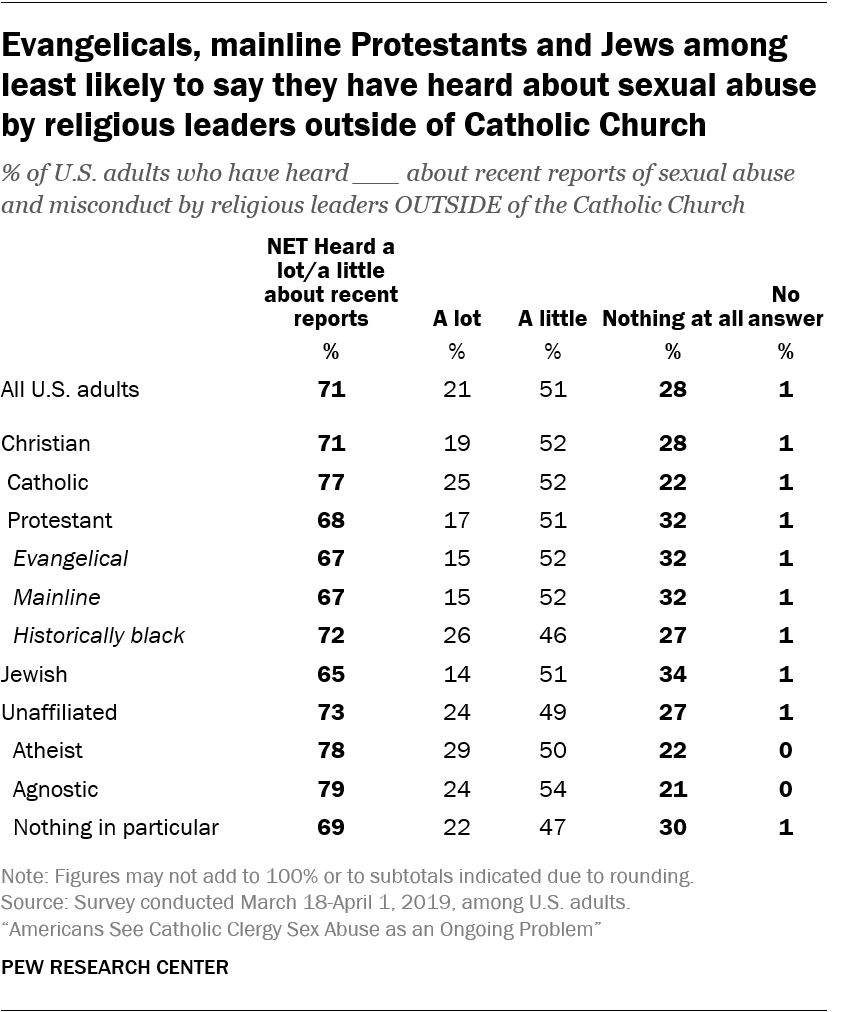 Most Americans also say they have heard something about recent reports of sexual abuse and misconduct by religious leaders outside of the Catholic Church, although U.S. adults on the whole are not as familiar with these reports as they are with abuse by Catholic priests and bishops.5 A majority of the public (71%) has heard at least “a little” about reports of abuse in faiths other than Catholicism, but more say they have heard a little (51%) than a lot (21%).
Most Americans also say they have heard something about recent reports of sexual abuse and misconduct by religious leaders outside of the Catholic Church, although U.S. adults on the whole are not as familiar with these reports as they are with abuse by Catholic priests and bishops.5 A majority of the public (71%) has heard at least “a little” about reports of abuse in faiths other than Catholicism, but more say they have heard a little (51%) than a lot (21%).
Among religious groups, Catholics (along with atheists and agnostics) are among the groups most likely to have heard something about the reports of abuse by religious leaders outside the Catholic Church. And while Jews are one of the groups most likely to have heard about abuse in the Catholic Church, they are among the least likely to say they have heard about abuse by non-Catholic leaders. Evangelical and mainline Protestants also are less likely than some other groups to have heard something about reports of sexual abuse outside of the Catholic Church, with two-thirds in each group saying they have heard at least a little.
 When it comes to opinions about whether the reports of sexual abuse and misconduct by Catholic priests and bishops reflect ongoing problems or things that happened in the past and mostly don’t happen anymore, large majorities across all major religious groups say the reports reflect ongoing problems. Just one-in-ten U.S. adults say the reports reflect things that are largely confined to the past.
When it comes to opinions about whether the reports of sexual abuse and misconduct by Catholic priests and bishops reflect ongoing problems or things that happened in the past and mostly don’t happen anymore, large majorities across all major religious groups say the reports reflect ongoing problems. Just one-in-ten U.S. adults say the reports reflect things that are largely confined to the past.
But U.S. Catholics stand out on this question. While most Catholics say clergy sexual abuse is an ongoing problem (69%), roughly a quarter (24%) think sexual abuse and misconduct by Catholic priests and bishops mostly doesn’t happen anymore – a larger share than in any other religious group.
Conversely, atheists are particularly likely to think sexual abuse in the Catholic Church is an ongoing problem. Just 3% of self-identified atheists say reports of abuse reflect things that happened in the past and have mostly stopped, while fully nine-in-ten (93%) think there are continuing problems.
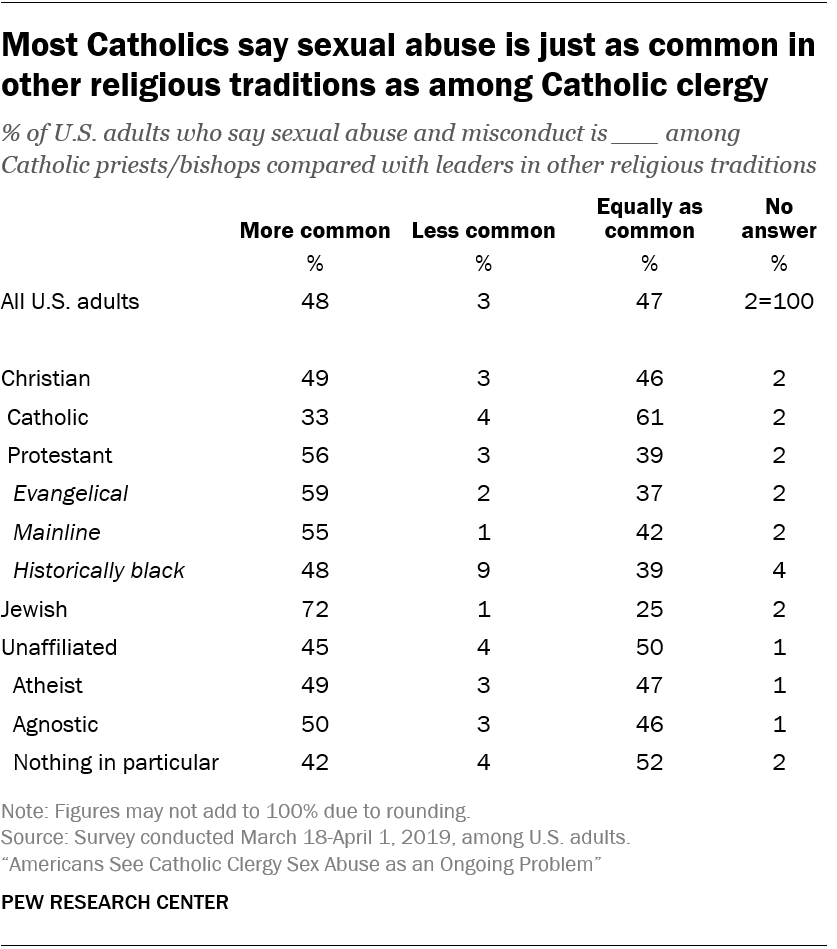 About half of U.S. adults (48%) say sexual abuse and misconduct is more common among Catholic priests and bishops than among leaders in other religious traditions, while a similar share (47%) say it is equally common across religious groups. Very few Americans (3%) say sexual abuse is less common in the Catholic Church than in other religious traditions.
About half of U.S. adults (48%) say sexual abuse and misconduct is more common among Catholic priests and bishops than among leaders in other religious traditions, while a similar share (47%) say it is equally common across religious groups. Very few Americans (3%) say sexual abuse is less common in the Catholic Church than in other religious traditions.
Catholics, however, clearly come down on one side of this question. Just one-third of U.S. Catholics think sexual abuse is particularly common in the Catholic Church, while a majority (61%) say abuse is equally as common among leaders in other religions – the highest share who hold this view among all major U.S. religious groups.
Meanwhile, Jews are particularly likely to say sexual abuse and misconduct is more common among Catholic priests and bishops (72%). About six-in-ten evangelical Protestants and more than half of mainline Protestants share this view. Religiously unaffiliated adults tend to be more divided in their opinions.
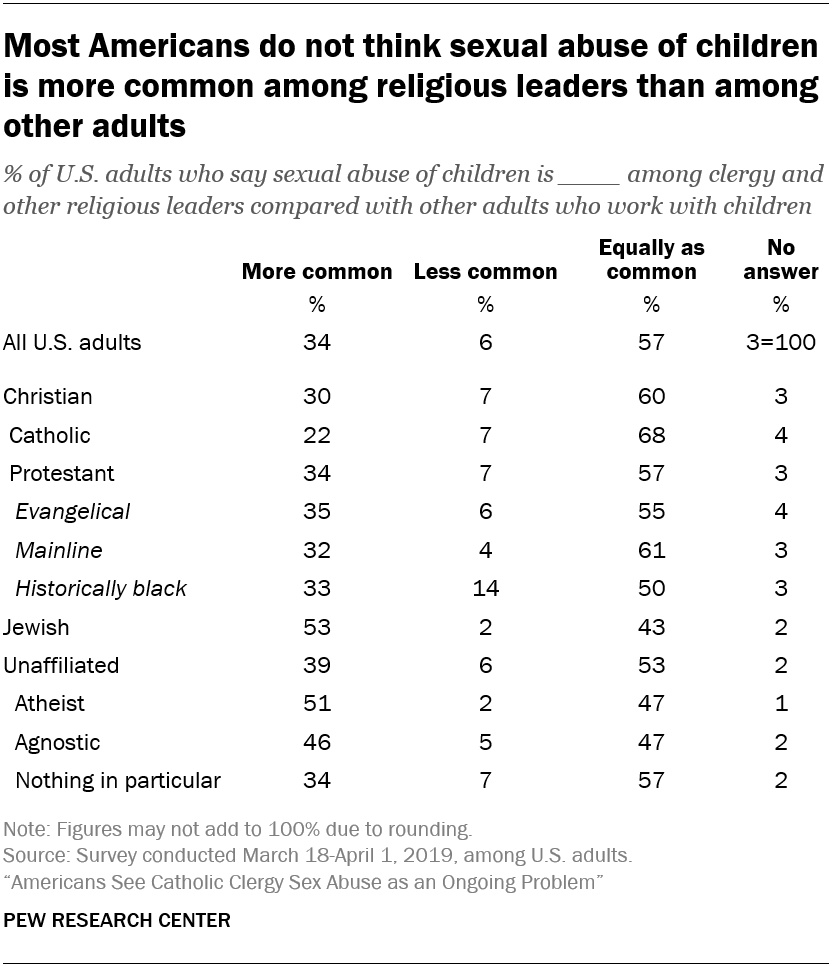 The survey also asked about the sexual abuse of children in nonreligious settings.6 Overall, a majority of U.S. adults (57%) say sexual abuse of children is just as common among adults who work with children in secular settings (such as teachers, coaches or camp counselors) as it is among clergy and other religious leaders. A third (34%) think sexual abuse of children is more common among religious leaders, and 6% say it is less common.
The survey also asked about the sexual abuse of children in nonreligious settings.6 Overall, a majority of U.S. adults (57%) say sexual abuse of children is just as common among adults who work with children in secular settings (such as teachers, coaches or camp counselors) as it is among clergy and other religious leaders. A third (34%) think sexual abuse of children is more common among religious leaders, and 6% say it is less common.
Again, Catholics are especially likely to say sexual abuse of children is not a problem unique to clergy but, rather, is just as common among other adults who work with children. Fully two-thirds of Catholics (68%) take this position; just 22% say sexual abuse is more common among religious leaders.
At the other end of the spectrum, Jews, atheists and agnostics are more likely to say sexual abuse of children is particularly common among clergy and other religious leaders. Roughly half of Jews (53%) and atheists (51%) and a similar share of agnostics (46%) say sexual abuse of children is a bigger issue among religious leaders than among other adults.
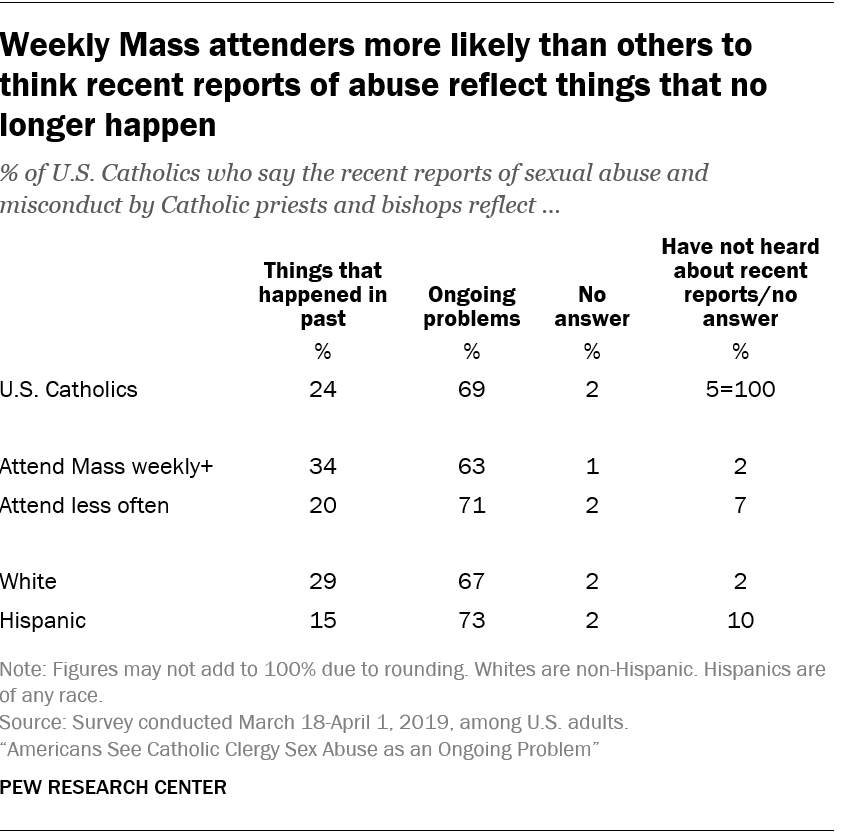 One-quarter of Catholics think the recent reports of sexual abuse and misconduct by Catholic priests and bishops reflect things that took place in the past and mostly no longer happen, while seven-in-ten say these problems are ongoing.
One-quarter of Catholics think the recent reports of sexual abuse and misconduct by Catholic priests and bishops reflect things that took place in the past and mostly no longer happen, while seven-in-ten say these problems are ongoing.
While majorities across Catholic subgroups say the recent reports of abuse reflect ongoing problems, there are some gaps in opinions. Catholics who attend Mass on a weekly basis are more likely than those who attend less often to say the problem is confined to the past. Fully one-third of Mass-attending Catholics say the reports of sexual abuse reflect past events that no longer happen, compared with one-in-five less-frequent attenders.
There are also divides along racial and ethnic lines. White Catholics are nearly twice as likely as Hispanic Catholics to think the reporting on sexual abuse within the church reflects things that no longer happen (29% vs. 15%).
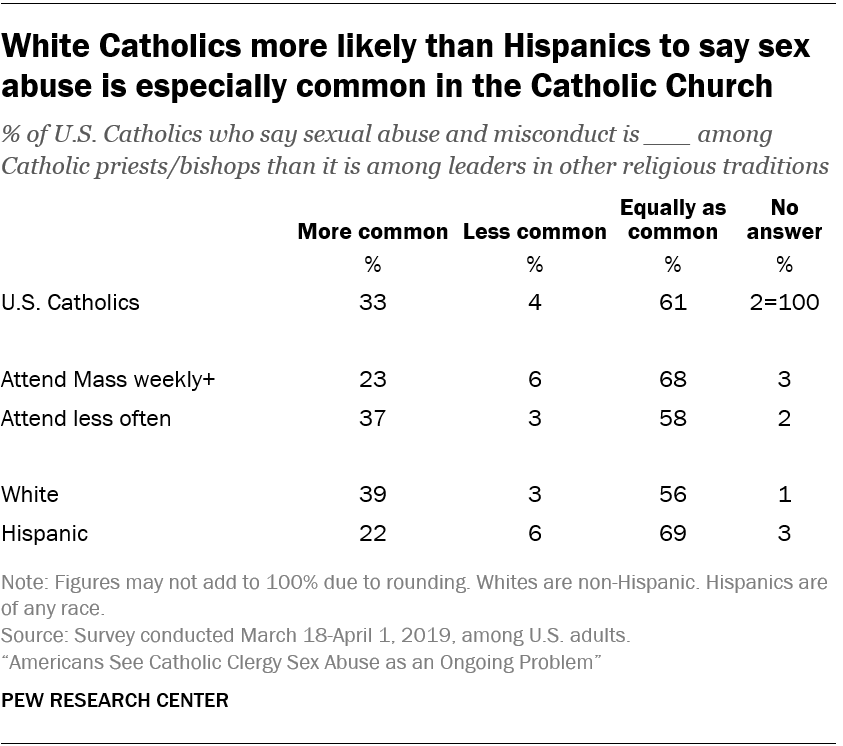 Meanwhile, most Catholics (61%) say that sexual abuse and misconduct is just as common in other religious traditions as it is in the Catholic Church, while one-third think sexual abuse is more common in the Catholic Church. This pattern is also reflected among Catholic subgroups, but views again vary by Mass attendance and ethnicity.
Meanwhile, most Catholics (61%) say that sexual abuse and misconduct is just as common in other religious traditions as it is in the Catholic Church, while one-third think sexual abuse is more common in the Catholic Church. This pattern is also reflected among Catholic subgroups, but views again vary by Mass attendance and ethnicity.
About one-in-four U.S. Catholics who attend Mass weekly (23%) think abuse is more common in the Catholic Church than in other religious traditions. By comparison, nearly four-in-ten Catholics who attend Mass less often (37%) say sexual abuse and misconduct is especially common among Catholic priests and bishops.
Among white Catholics, four-in-ten (39%) think sexual abuse is more common among Catholic leaders than it is among leaders in other religious traditions. But Hispanic Catholics are less likely to say abuse is more common in the Catholic Church. One-in-five in this group (22%) say sexual abuse is more common among Catholic priests and bishops, while 69% think it’s a problem that is just as prevalent in other religious traditions.
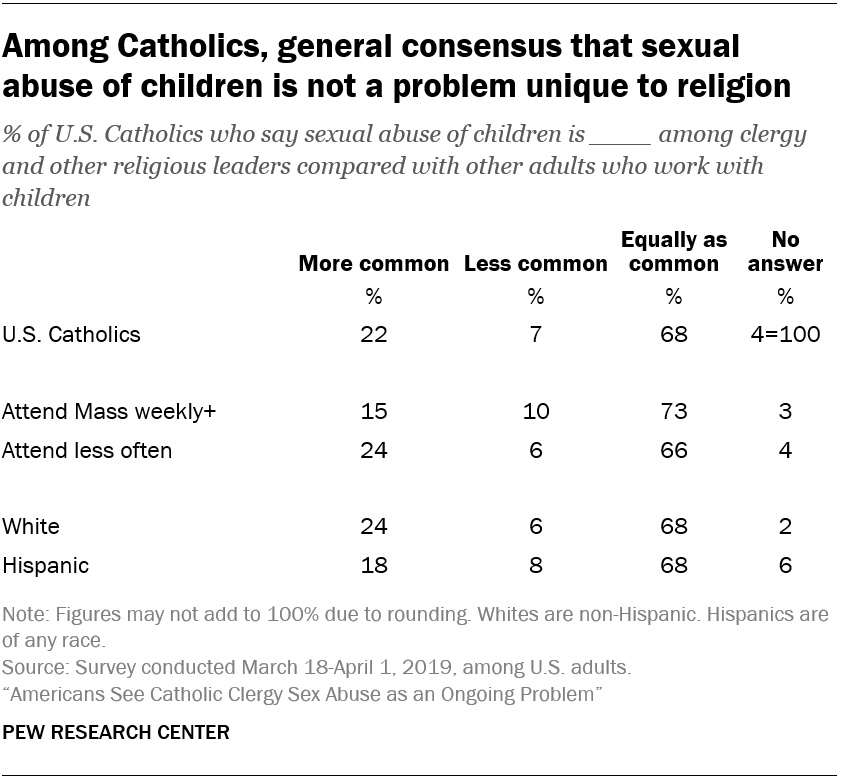
On the question of whether sexual abuse of children is more common among religious leaders than among other adults who work with children, there is consensus among Catholics. Two-thirds say sexual abuse is equally as common among religious leaders as it is among other adults who work with children (68%). The opinions of white Catholics and Hispanic Catholics mirror those of the Catholic population as a whole.
However, opinions differ somewhat between Catholics who attend Mass on a weekly basis and those who go less often. Majorities in both groups think sexual abuse of children is equally common among clergy as among other adults, but less-frequent attenders are 9 percentage points more likely than weekly attenders to say sexual abuse is more common among clergy (24% vs. 15%).
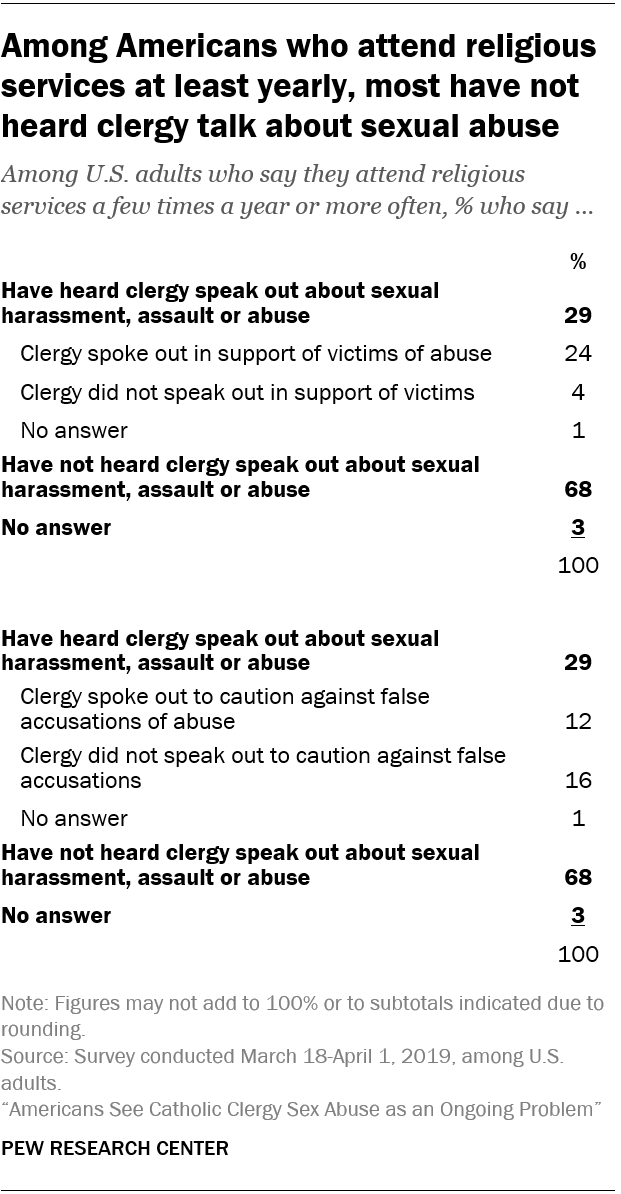 U.S. adults who say they attend religious services a few times a year or more often were asked if the clergy or other religious leaders at their place of worship have spoken out about sexual harassment, assault or abuse. Within this group, about three-in-ten say their clergy have spoken out about sexual abuse (29%) while two-thirds say they have not heard their clergy say anything about this topic (68%).
U.S. adults who say they attend religious services a few times a year or more often were asked if the clergy or other religious leaders at their place of worship have spoken out about sexual harassment, assault or abuse. Within this group, about three-in-ten say their clergy have spoken out about sexual abuse (29%) while two-thirds say they have not heard their clergy say anything about this topic (68%).
When it comes to the messages that churchgoers are hearing, one-in-four say their clergy have spoken out in support of victims of sexual abuse, and 12% say their clergy have warned against false accusations of abuse.
Among those who attend religious services at least a few times a year, one-in-ten say their clergy have spoken out both in support of victims of sexual abuse and to caution against false accusations. In terms of regular attenders who are only hearing one type of message from their clergy, more hear only about supporting victims (14%) than only about false accusations (2%).
There are similar patterns among religious groups, with the exception of Catholics. Catholics are more likely than other U.S. Christians to hear clergy talking about sex abuse in general (41% among Catholics vs. 27% among Protestants). And Catholics who attend Mass at least a few times a year are more likely to say they hear their clergy talk only about supporting victims (24%), compared with a smaller share among Protestants (11%).
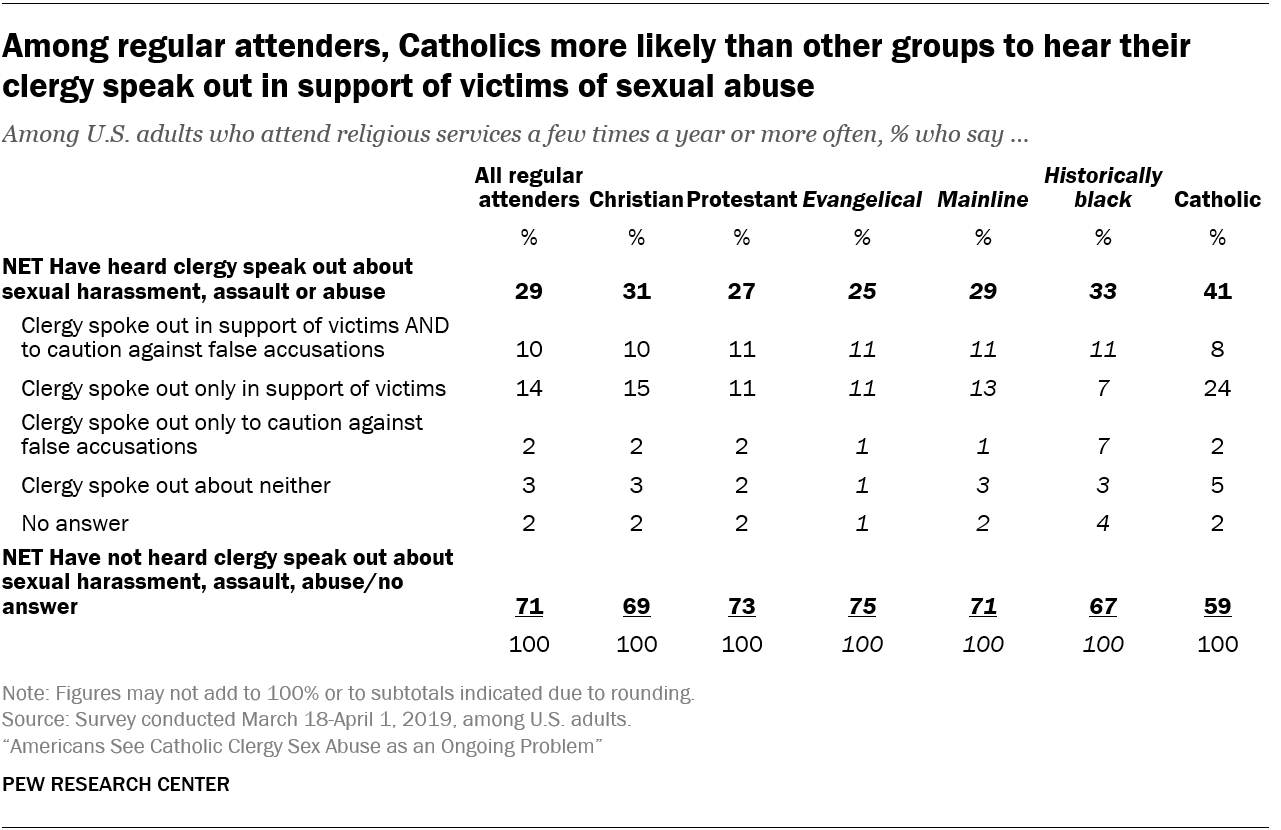
 Catholics also were asked whether they have discussed the recent reports of abuse by Catholic priests and bishops with family, friends or acquaintances. Overall, about half of Catholics say they’ve talked at least some about recent reports of sexual abuse, including 10% who say they’ve talked about this “a lot,” and 37% who say they’ve talked about this “some.” A similar share (47%) say they have not talked about this issue much or at all.
Catholics also were asked whether they have discussed the recent reports of abuse by Catholic priests and bishops with family, friends or acquaintances. Overall, about half of Catholics say they’ve talked at least some about recent reports of sexual abuse, including 10% who say they’ve talked about this “a lot,” and 37% who say they’ve talked about this “some.” A similar share (47%) say they have not talked about this issue much or at all.
Six-in-ten regular Mass attenders say they have talked with others at least some about the recent reports of abuse (58%), while four-in-ten have not talked with others much or at all (40%). By comparison, a smaller share of less-frequent attenders say they have talked at least some with family, friends or acquaintances about the recent reports of sexual abuse and misconduct (42%).
https://www.pewforum.org/2019/06/11/americans-see-catholic-clergy-sex-abuse-as-an-ongoing-problem/
Child Molesters are using web sites to date their victims.
Child molesters are sexual interested in the same type of underage victim. Just like an adult relationship, molesters abuse the same age, sex, and features of their prey. All the behavior shown by adults interested id dating someone is exhibited by a child molester. Common red flags involve dating time alone with a child . Babysitting, sleep overs, sports activities, entertainment venues, and restaurants are the typical venues child molesters use to abuse your children. If it looks like someone is dating your child, they probably are dating your child. Friends, families, neighbors, and parents of your children's friends are the main source of sexual abuse agaisnt children. Parents need to be involved in their children's lives all the time to protect them from rapists. No one should be discussing your child's schedule without you involved in the conversation.
Predators use these 19 apps to lure minors. This is what parents need to know.
First, parents worried about their children being approached by predators at grocery stores and on playgrounds. Then the threat moved online via shady profiles on social media.
Now, authorities say, some phone apps have opened even more channels of communication between adult predators and minors -- including some video games like Fortnite and Minecraft.
Arrests of alleged child predators have been made after communicating through apps like Kik, Wishbone, Tumblr and even video games like Fortnite, Minecraft and Discord.
"If children appear anxious of evasive when the topic is raised, it may be a red flag," Grewal said.
"It's critical that parents talk to their children about social media and chat apps to let them know that the people they encounter may not be who they initially seemed to be."
https://www.nj.com/news/2018/09/fortnite_mindcraft_join_other_platforms_where_pred.html
Predators use these 19 apps to lure minors. This is what parents need to know.
First, parents worried about their children being approached by predators at grocery stores and on playgrounds. Then the threat moved online via shady profiles on social media.Now, authorities say, some phone apps have opened even more channels of communication between adult predators and minors -- including some video games like Fortnite and Minecraft.
Arrests of alleged child predators have been made after communicating through apps like Kik, Wishbone, Tumblr and even video games like Fortnite, Minecraft and Discord. "If children appear anxious of evasive when the topic is raised, it may be a red flag," Grewal said."It's critical that parents talk to their children about social media and chat apps to let them know that the people they encounter may not be who they initially seemed to be."
https://www.nj.com/news/2018/09/fortnite_mindcraft_join_other_platforms_where_pred.html
The Reality of Child Trafficking Rings
7 Things You Probably Didn’t
Know About Human Trafficking
#1- Many children and teens are trafficked “in plain sight.”#2- Your child has already been targeted by a human trafficker. #3- Foster care children, immigrants, and refugees are at greatest risk for becoming victims. #4- Traffickers can be doctors, lawyers, and CEOs, too. #5- Boys are trafficked, too. #6- Human trafficking doesn’t just happen in big cities. #7- Pedophiles and traffickers can message your children through YouTube.
https://military.citymomsblog.com/military-moms/your-child-has-already-been-targeted-7-things-you-didnt-know-about-human-trafficking/?fbclid=IwAR10AKSOAvggoumRM0k2f1SJ86lYVNRN4iLqOAX1LM3TW1PwHz7rCbZvWKk
Sex offenders in dating apps: More private data access for companies?
Tinder Lets Known Sex Offenders Use the App. It’s Not the Only One
"PlentyofFish is among 45 online dating brands now owned by Match Group, the Dallas-based corporation that has revenues of $1.7 billion and that dominates the industry in the U.S. Its top dating app, Tinder, has 5.2 million subscribers, surpassing such popular rivals as Bumble.For nearly a decade, its flagship website, Match, has issued statements and signed agreements promising to protect users from sexual predators. The site has a policy of screening customers against government sex offender registries. But over this same period, as Match evolved into the publicly traded Match Group and bought its competitors, the company hasn’t extended this practice across its platforms — including PlentyofFish, its second most popular dating app. The lack of a uniform policy allows convicted and accused perpetrators to access Match Group apps and leaves users vulnerable to sexual assault, a 16-month investigation by Columbia Journalism Investigations found."
https://www.propublica.org/article/tinder-lets-known-sex-offenders-use-the-app-its-not-the-only-one
Uber reveals nearly 6,000 incidents of sexual assaults in new safety report
On Uber, hundreds of rape allegations go unreported to police
Buried inside Uber’s inaugural safety report this week that detailed thousands of sexual assaults and more than 100 deaths was another staggering revelation: Hundreds of rape allegations have gone undisclosed to law enforcement. Uber said in its 84-page transparency report, released Thursday, that law enforcement was involved in only 37 percent of the 464 reports of rape during Uber’s U.S. rides in 2017 and 2018. That suggests police weren’t aware of nearly 300 rape allegations, potential felonies. Uber didn’t disclose the involvement of law enforcement in the 6,000 reports of sexual assault. That means police are potentially unaware of thousands more cases of sexual assaults.
https://www.yahoo.com/gma/uber-reveals-nearly-6-000-incidents-sexual-assaults-111817559--abc-news-topstories.html
We use cookies to analyze website traffic and optimize your website experience. By accepting our use of cookies, your data will be aggregated with all other user data.